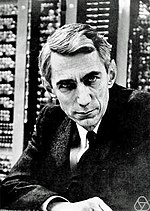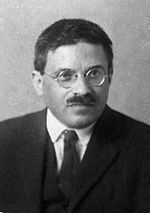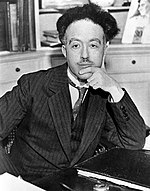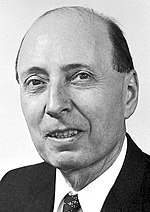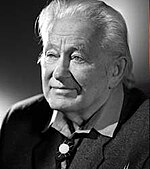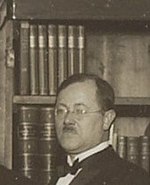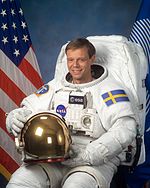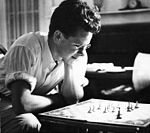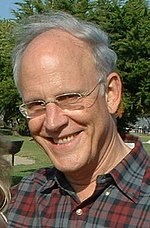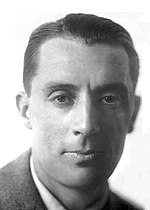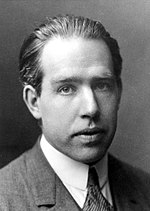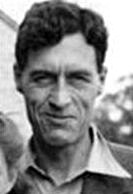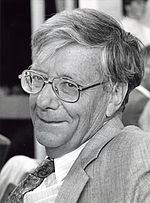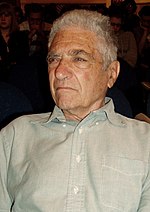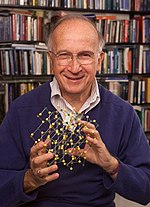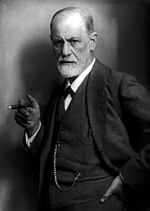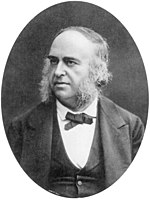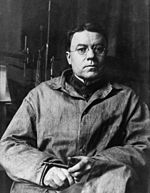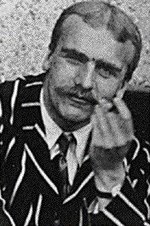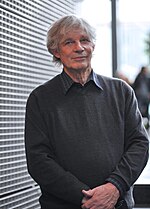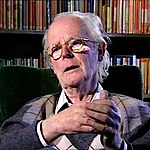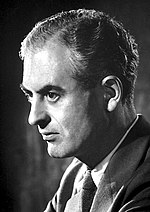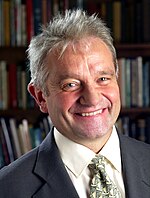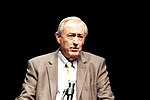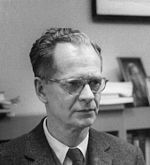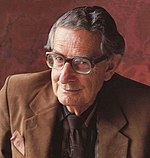فهرست دانشمندان خداناباور: تفاوت میان نسخهها
←علوم مهندسی: بوریس چتروک |
←ریاضی و علوم کامپیوتر: ویلیام کینگدم کلیفورد |
||
| خط ۳۸۷: | خط ۳۸۷: | ||
| |
| |
||
|<ref>{{cite web|last1=Cailliau|first1=Robert|title=Atheism|url=http://www.robertcailliau.eu/Alphabetical/A/Atheism/|website=www.cailliau.org|quote=As Richard Dawkins points out, I have no obligation to explain why I am an atheist, it’s for those who believe in a god to supply evidence. Atheism, religion, science and ethics are linked: Religion provides a simple world view based on the existence of one or more gods. Gods are super-beings who are unscrutable, far superior to humans and endowed with supernatural powers. Such a world view starts from the axiom that humans will not be able to understand the world around them. There is no further argument possible: one lives "by the book".|access-date=2016-10-20|archive-url=https://web.archive.org/web/20150924091611/http://www.robertcailliau.eu/Alphabetical/A/Atheism/|archive-date=2015-09-24|url-status=dead}}</ref> |
|<ref>{{cite web|last1=Cailliau|first1=Robert|title=Atheism|url=http://www.robertcailliau.eu/Alphabetical/A/Atheism/|website=www.cailliau.org|quote=As Richard Dawkins points out, I have no obligation to explain why I am an atheist, it’s for those who believe in a god to supply evidence. Atheism, religion, science and ethics are linked: Religion provides a simple world view based on the existence of one or more gods. Gods are super-beings who are unscrutable, far superior to humans and endowed with supernatural powers. Such a world view starts from the axiom that humans will not be able to understand the world around them. There is no further argument possible: one lives "by the book".|access-date=2016-10-20|archive-url=https://web.archive.org/web/20150924091611/http://www.robertcailliau.eu/Alphabetical/A/Atheism/|archive-date=2015-09-24|url-status=dead}}</ref> |
||
|- |
|||
| ۳۵ |
|||
|[[پرونده:Clifford William Kingdon.jpg |150px]] |
|||
|[[ویلیام کینگدم کلیفورد]] |
|||
|{{پرچم|بریتانیا}} |
|||
|جبر هندسی<ref group="lower-alpha">Geometric algebra</ref>{{سخ}}[[تابع بسل-کلیفورد]] |
|||
| |
|||
|<ref>{{cite book|title=A New Approach to Differential Geometry Using Clifford's Geometric Algebra|url=https://archive.org/details/newapproachtodif00snyg|url-access=limited|year=2011|publisher=Springer|isbn=9780817682828|page=[https://archive.org/details/newapproachtodif00snyg/page/n128 111]|author=John Snygg|quote=However, the dogmatic position of the Anglican Church against Darwin's theory of evolution induced him to reexamine his beliefs. He soon evolved into an agnostic and then an atheist.}}</ref> |
|||
|} |
|} |
||
نسخهٔ ۱۷ اوت ۲۰۲۰، ساعت ۲۰:۵۳
این مقاله هماکنون برای مدتی کوتاه تحت ویرایش عمده است. این برچسب بهمنظور جلوگیری از تعارض ویرایشی اینجا گذاشته شدهاست. لطفاً تا زمانی که این پیام در اینجا نمایش داده میشود، ویرایشی در این صفحه انجام ندهید. این صفحه آخرین بار در ۱۷ اوت ۲۰۲۰، ساعت ۲۰:۵۳ (ساعت هماهنگ جهانی) (۳ سال پیش) ویرایش شده است – این زمان تخمینی موجود در میانگر است؛ . اگر این صفحه در چند ساعت اخیر ویرایش نشده است، لطفاً این الگو را حذف کنید. اگر خودتان این الگو را به صفحه اضافه کردهاید، لطفاً در میانهٔ بازههای مختلف ویرایشی آن را حذف کنید یا با {{در دست ساخت}} جایگزین کنید. |
| بخشی از سریها |
| بیدینی |
|---|
دانشمندان خداناباور دانشمندانی هستند که به وجود خدا اعتقاد ندارند. خداناباوری بهمعنای عدم باور به وجود خدا است.[۱][۲] تخمین زده میشود که بین سالهای ۱۹۰۰ تا ۲۰۰۰ و از میان ۶۵۴ برنده جایزه نوبل، در مجموع، حدود ۱۰٫۵ درصد از برندگان خداناباور، آگنوستیک یا آزاداندیش بودهاند.[۳]

مطابق یک بررسی در سال ۱۹۱۴، از میان ۱۰۰۰ دانشمند عضو آکادمی ملی علوم آمریکا که بهطور تصادفی انتخاب شدهبودند، ۵۸٪ خداناباور بوده یا در وجود خدا شک داشتهاند و زمانی که این بررسی محدود به ۴۰۰ دانشمند برجسته شد، این آمار به حدود ۷۰٪ افزایش یافت.[۴] تکرار همین بررسی در ۲۰ سال بعد، نشان داد که دو عدد بهدست آمده رشد داشته و بهترتیب به ۶۷٪ و ۸۵٪ رسیدهاند.[۴] انجام دهندگان این تحقیق علت درصد بالاتر در میان دانشمندان برجستهتر را نتیجه دانش بالاتر، درک و تجربهگرایی دانستند.[۴] همین شیوه انتخاب و پرسش در سال ۱۹۹۶ توسط گروه دیگری به انجام رسید و اعداد تقریبا مشابهی بهدست آمد بهطوری که از میان ۱۰۰۰ دانشمند عضو آکادمی ملی علوم آمریکا که بهطور تصادفی انتخاب شدهبودند، ۶۰٫۷٪ از این دانشمندان خداناباور بوده یا در وجود خدا شک داشتهاند.[۴] این بررسی نشان داد که دانشمندان زیستشناسی عضو آکادمی ملی علوم ۶۵٫۲٪ خداناباور و ۶۹٪ نامعتقد به جاودانگی[a] (پس از مرگ) هستند. مطابق همین این آمار، میزان خداناباوری برای فیزیکدانهای عضو آکادمی ملی علوم برابر ۷۹٪ و میزان ناباوری به جاودانگی برابر با ۷۶٫۳٪ بودهاست. درصد بالایی از زیستشناسان و فیزیکدانان باقی مانده در آمار اعلام شده نیز ندانمگرا بودهاند و تنها درصد کمی به وجود خدا باور داشتهاند.[۴]
طبق گزارشی از روزنامهٔ دیلی میل افراد بی اعتقاد به وجود خدا از هوشمندی بیشتری نسبت به باورمندان برخودارند.[۵] مطابق نظرسنجی مؤسسه پیو که در سال ۲۰۰۹ روی ۲۵۰۰ نفر از دانشمندان عضو انجمن پیشبرد علوم آمریکا انجام شد، ۵۱٪ به نوعی الوهیت یا قدرت بالاتر[b]، ۳۳٪ به خدا[c] و ۱۸٪ به یک روح جهانی یا قدرت بالاتر،[d] اعتقاد داشتند، در حالیکه ۴۱٪ به وجود خدا یا قدرت بالاتر[e] اعتقاد نداشتند.[۶]
تنها چهار نفر موفق به کسب دو جایزه نوبل شدهاند که عبارتاند از ماری کوری (فیزیک ۱۹۰۳ و شیمی ۱۹۱۱)، لینوس پاولینگ (شیمی ۱۹۵۴ و صلح ۱۹۶۲)، جان باردین (فیزیک ۱۹۵۶ و ۱۹۷۲) و فردریک سنگر (شیمی ۱۹۵۸ و ۱۹۸۰) که هیچکدام یک از آنها خداباور نبودند. ماری کوری، لینوس پاولینگ و جان باردین خداناباور و فردریک سنگر ندانمگرای خداناباور بود.[۷][۸]
بر اساس زمینه علمی
ریاضی و علوم کامپیوتر
فیزیک و اخترفیزیک
شیمی
علوم زیستی
زمینشناس
| شماره | نگاره | نام | ملیت | شهرت | توضیحات | منبع |
|---|---|---|---|---|---|---|
| ۱ | 
|
دونالد پروترو[w] | دیرینهشناسی پستانداران | [۳۲۰] | ||
| ۲ | 
|
سلال سنگور[x] | زمینساخت ترکیه و آسیا استاد دانشگاه فنی استانبول |
[۳۲۱] |
علوم مهندسی
| شماره | نگاره | نام | ملیت | شهرت | توضیحات | منبع |
|---|---|---|---|---|---|---|
| ۱ | 
|
رادنی بروکس | علوم رباتیک | [۳۲۲] | ||
| ۲ | 
|
چارلز فرانسیس ریشتر | پدیدآوردن مقیاس ریشتر | [۳۲۳] | ||
| ۳ | 
|
هربرت کرومر | لیزر اتصال ناهمگون ترانزیستور پیوند نامتناجس |
[۳۲۴] | ||
| ۴ | 
|
ژوزف میشل مونگلفیه | مخترع بالن هوای گرم | [۳۲۵][۳۲۶] | ||
| ۵ | 
|
دن شختمن | شبهکریستال |
[۳۲۷] | ||
| ۶ | 
|
هانس آلفون | مگنتوهیدرودینامیک |
[۳۲۸] | ||
| ۷ | پرونده:Черток Борис Евсеевич.jpg | بوریس چتروک[y] | طراح سیستم کنترل در برنامه فضایی شوروی | [۳۲۹] |
علوم انسانی
واژهنامه
- ↑ Immortality
- ↑ Some form of deity or higher power
- ↑ God
- ↑ A universal spirit or higher power
- ↑ God or a higher power
- ↑ Decision theory
- ↑ Bishop–Phelps theorem
- ↑ Vendergood language
- ↑ Descriptive geometry
- ↑ Subsurface
- ↑ Robert Cailliau
- ↑ The Web Conference
- ↑ Geometric algebra
- ↑ Nuclear spectroscopy
- ↑ Paul Callaghan
- ↑ Isolobal principle
- ↑ Larned B. Asprey
- ↑ Colin Blakemore
- ↑ Calvin Bridges
- ↑ Geoffrey Burnstock
- ↑ Purinergic signalling
- ↑ Sean B. Carroll
- ↑ Donald Prothero
- ↑ Celâl Şengör
- ↑ Boris Chertok
- ↑ 16 Personality Factors
- ↑ Skinner Box
- ↑ Eysenck Personality Questionnaire
- ↑ Differential psychology
- ↑ Social comparison theory
- ↑ Therapeutic techniques for children
- ↑ Student-centered learning
- ↑ The Person-centered approach
- ↑ Hector Avalos
جستارهای وابسته
منابع
- ↑ religioustolerance.org's short article on Definitions of the term "Atheism" suggests that there is no consensus on the definition of the term. Simon Blackburn summarizes the situation in The Oxford Dictionary of Philosophy: "Atheism. Either the lack of belief in a god, or the belief that there is none". Most dictionaries (see the OneLook query for "atheism") first list one of the more narrow definitions.
- ↑ Runes, Dagobert D.(editor) (1942 edition). Dictionary of Philosophy. New Jersey: Littlefield, Adams & Co. Philosophical Library. ISBN 0064634612. Retrieved 2010-02-01.
(a) the belief that there is no God; (b) Some philosophers have been called "atheistic" because they have not held to a belief in a personal God. Atheism in this sense means "not theistic". The former meaning of the term is a literal rendering. The latter meaning is a less rigorous use of the term though widely current in the history of thought
{{cite book}}:|first=has generic name (help); Check date values in:|year=(help) – entry by Vergilius Ferm - ↑ Emil O. W. Kirkegaard. "Nobel prize winners are very unlikely to be religious". emilkirkegaard. Retrieved 7 June 2018.
{{cite news}}: Cite has empty unknown parameter:|1=(help) - ↑ ۴٫۰ ۴٫۱ ۴٫۲ ۴٫۳ ۴٫۴ Edward J. Larson; Larry Witham (23 July 1998). "Leading scientists still reject God". Nature. Retrieved 16 August 2016.
- ↑ Colin Fernandez; Sarah Griffiths. "Atheists are more likely to be psychopaths, study claims". Mail Online. Dailymail. Retrieved 23 March 2016.
However, believers aren't spared criticism - the study also found that religious people are less intelligent than their non-believing counterparts.
- ↑ Pew research center (2009). "Scientists and Belief". Pew research center (به انگلیسی).
- ↑ Hargittai, István (April 1999). "Interview: Frederick Sanger". The Chemical Intelligencer. New York: Springer-Verlag. 4 (2): 6–11.. This interview, which took place on 16 September 1997, was republished in Hargittai, István (2002). "Chapter 5: Frederick Sanger". Candid science II: conversations with famous biomedical scientists. London: Imperial College Press. pp. 73–83. ISBN 978-1-86094-288-4.
- ↑ Ahuja, Anjana (12 January 2000). "The double Nobel laureate who began the book of life". The Times. London. p. 40. Archived from the original on 11 December 2008. Retrieved 18 October 2010 – via warwick.ac.uk.
- ↑ Russell, Bertrand (1947). "Am I An Atheist or an Agnostic?". Encyclopedia of Things. Archived from the original on 22 June 2005. Retrieved 6 July 2005.: "I never know whether I should say "Agnostic" or whether I should say "Atheist"... As a philosopher, if I were speaking to a purely philosophic audience I should say that I ought to describe myself as an Agnostic, because I do not think that there is a conclusive argument by which one prove (sic) that there is not a God. On the other hand, if I am to convey the right impression to the ordinary man in the street I think I ought to say that I am an Atheist..."
- ↑ Lucas Garron (December 2010). "Background & Currents". NATIONAL SOCIALISM AND THE DEATH OF GERMAN MATHEMATICS (PDF). p. 8. Archived from the original (PDF) on 13 May 2015. Retrieved 9 July 2012.
Hilbert was famously atheist, but mathematics at the time often bordered on philosophy
- ↑ "Mathematics is a presuppositionless science. To found it I do not need God, as does Kronecker, or the assumption of a special faculty of our understanding attuned to the principle of mathematical induction, as does Poincaré, or the primal intuition of Brouwer, or, finally, as do Russell and Whitehead, axioms of infinity, reducibility, or completeness, which in fact are actual, contentual assumptions that cannot be compensated for by consistency proofs." David Hilbert, Die Grundlagen der Mathematik, Hilbert's program, 22C:096, University of Iowa.
- ↑ Michael R. Matthews (2009). Science, Worldviews and Education. Springer. p. 129. ISBN 9789048127795.
As is well known, Hilbert rejected Leopold Kronecker's God for the solution of the problem of the foundations of mathematics.
- ↑ "Napoleon replies: "How comes it, then, that Laplace was an atheist? At the Institute neither he nor Monge, nor Berthollet, nor Lagrange believed in God. But they did not like to say so." Baron Gaspard Gourgaud, Talks of Napoleon at St. Helena with General Baron Gourgaud (1904), page 274.
- ↑ Napoleon said to Pierre Simon Laplace: "You have written this huge book on the system of the world without once mentioning the author of the universe [God]." Laplace replied: "Sire, I had no need of that hypothesis." Quoted in Augustus De Morgan, A Budget of Paradoxes, London, Longmans, Green and Co. , 1872. As found in http://www-history.mcs.st-andrews.ac.uk/~history/Quotations/Laplace.html, accessed 13 February 2006.
- ↑ "The Catholic newspaper La Quotidienne [The Daily] announced that Laplace had died in the arms of two curés (priests), implying that he had a proper Catholic end, but this is not credible. To the end, he remained a skeptic, wedded to his deterministic creed and to an uncompromised ethos derived from his vast scientific experience." Roger Hahn, Pierre Simon Laplace, 1749–1827: a determined scientist, page 204.
- ↑ "Laplace Theorizes That the Solar System Originated from a Cloud of Gas." Science and Its Times: Understanding the Social Significance of Scientific Discovery. Encyclopedia.com, n.d. Web. 23 Jan. 2017. <http://www.encyclopedia.com/science/encyclopedias-almanacs-transcripts-and-maps/laplace-theorizes-solar-system-originated-cloud-gas>. "The two greatest astronomers of Revolutionary and Napoleonic France were Laplace and his rival, Joseph Jérôme Le Français de Lalande (1732–1807), director of the Paris Observatory. Both were atheists. "
- ↑ Sylvia Nasar (2011). "Chapter 17: Bad Boys". A Beautiful Mind. Simon and Schuster. p. 143. ISBN 978-1-4391-2649-3.
In this circle, Nash learned to make a virtue of necessity, styling himself self-consciously as a "free thinker." He announced that he was an atheist.
- ↑ Sylvia Nasar (1999). A Beautiful Mind: A Biography of John Forbes Nash, Jr. , Winner of the Nobel Prize in Economics, 1994. Simon and Schuster. ISBN 978-0-684-85370-3.
Nash, by then an atheist, balked at a Catholic ceremony. He would have been happy to get married in city hall.
- ↑ Joseph McCabe (1945). A Biographical Dictionary of Ancient, Medieval, and Modern Freethinkers. Haldeman-Julius Publications. Retrieved 10 April 2012. "In his last words (published as Last Thoughts, 1913) he entirely rejects Christianity and believes in God only in the sense that he is the moral ideal. In effect he was an atheist."
- ↑ Poincaré, Henri (January 1, 1913). Dernières Pensées. p. 138. Retrieved 10 April 2012. "Les dogmes des religions révélées ne sont pas les seuls à craindre. L'empreinte que le catholicisme a imprimée sur l'âme occidentale a été si profonde que bien des esprits à peine affranchis ont eu la nostalgie de la servitude et se sont efforcés de reconstituer des Eglises ; c'est ainsi que certaines écoles positivistes ne sont qu'un catholicisme sans Dieu. Auguste Comte lui- même rêvait de discipliner les âmes et certains de ses disciples, exagérant la pensée du maître, deviendraient bien vite des ennemis de la science s'ils étaient les plus forts."
- ↑ Galina Weinstein, A Biography of Henri Poincaré – 2012 Centenary of the Death of Poincaré, arXiv:1207.0759, physics.hist-ph, 2012
- ↑ "This loss shattered Turing's religious faith and led him into atheism..." Time 100 profile of Alan Turing, p. 2
- ↑ "He was an atheist..." Alan Turing: Father of the computer, BBC News, April 28, 1999. Retrieved June 11, 2007.
- ↑ Steve Batterson (2007). Steven Smale: The Mathematician Who Broke the Dimension Barrier. American Mathematical Soc. p. 11. ISBN 978-0-8218-2696-6.
Jack and Norm were religious individuals, whereas Steve was an atheist who had never been inside a church.
- ↑ Colm Mulcahy (2013-03-26). "Centenary of Mathematician Paul Erdős -- Source of Bacon Number Concept". Huffington Post. Retrieved 13 April 2013.
In his own words, "I'm not qualified to say whether or not God exists. I kind of doubt He does. Nevertheless, I'm always saying that the SF has this transfinite Book that contains the best proofs of all mathematical theorems, proofs that are elegant and perfect...You don't have to believe in God, but you should believe in the Book." (SF was his tongue- in-cheek reference to God as "the Supreme Fascist").
- ↑ "Conway propped up the pillow behind his head and grinned. "I like showing off. When I make a new discovery, and I really like telling people about it. I guess I'm not so much a mathematician as a teacher. In America, kids aren't supposed to like mathematics. It's so sad.' Conway sat up suddenly. 'Most people think that mathematics is cold. But it's not at all! For me, the whole damn thing is sensual and exciting. I like what it looks like, and I get a hell of a lot more pleasure out of math than most people do out of art!' He relaxed slightly, and he lowered his voice. 'I feel like an artist. I like beautiful things – they're there already; man doesn't have to create it. I don't believe in God, but I believe that nature is unbelievably subtle and clever. In physics, for instance, the real answer to a problem is usually so subtle and surprising that it wasn't even considered in the first place. That the speed of light is a constant – impossible! Nobody even thought about it. And quantum mechanics is even worse, but it's so beautiful, and it works!"", John Horton Conway in an interview with Charles Seife, The Sciences (1994).
- ↑ Jonathan Israel (2011). Democratic Enlightenment: Philosophy, Revolution, and Human Rights 1750–1790. Oxford University Press. p. 115. ISBN 978-0-19-954820-0.
D'Alembert, though privately an atheist and materialist, presented the respectable public face of 'la philosophie' in the French capital while remaining henceforth uninterruptedly aligned with Voltaire.
- ↑ James E. Force; Richard Henry Popkin (1990). James E. Force; Richard Henry Popkin (eds.). Essays on the Context, Nature, and Influence of Isaac Newton's Theology. Springer. p. 167. ISBN 978-0-7923-0583-5.
Unlike the French and English deists, and unlike the scientific atheists such as Diderot, d'Alembert, and d'Holbach,...
- ↑ Shaposhnikova, T. O. (1999). Jacques Hadamard: A Universal Mathematician. American Mathematical Soc. pp. 33–34. ISBN 978-0-8218-1923-4.
In 1924, Hadamard recounted his meetings with Hermite: "...When Hermite loved to direct to me remarks such as: "He who strays from the paths traced by Providence crashes." These were the words of a profoundly religious man, but an atheist like me understood them very well, especially when he added at other times: "In mathematics, our role is more that of servant than master.""
- ↑ "Hardy... was a stringent atheist..." Hit Play on Ramanujan بایگانیشده در ۱۶ اکتبر ۲۰۰۷ توسط Wayback Machine, by Lisa Drostova, East Bay Express, April 30, 2003. Retrieved October 7, 2007.
- ↑ "The first Bombe to be delivered was named Agnus by Turing: a joke that atheist Hardy might have made..." Alan Turing — a Cambridge Scientific Mind, by Andrew Hodges, Cambridge Scientific Minds (Cambridge University Press, 2002) Retrieved July 2, 2007.
- ↑ "Outside the field of scientific research, he was known for his outspoken atheism: belief in God, he once declared, is not only incompatible with good science, but is "damaging to the wellbeing of the human race." " The Telegraph. [۱]
- ↑ "Sam Karlin, mathematician who improved DNA analysis, dies". Stanford Report. January 16, 2008. Retrieved 21 April 2012.
Karlin was born in Yonova, Poland, in 1924. His family immigrated to Chicago when he was a small child and struggled financially through the Great Depression. He was raised in a strict Orthodox Jewish household but broke with religion in his early teens and remained an atheist for the rest of his life.
- ↑ Venjamin Fedorovič Kagan (1957). N. Lobachevsky and His Contribution to Science. Foreign Languages Publishing House. p. 29. Retrieved 4 February 2017.
- ↑ Bardi, Jason (2008). The Fifth Postulate: How Unraveling a Two Thousand Year Old Mystery Unraveled the Universe. John Wiley & Sons. p. 186. ISBN 978-0-470-46736-7.
- ↑ "Of course, Markov, an atheist and eventual excommunicate of the Church quarreled endlessly with his equally outspoken counterpart Nekrasov. The disputes between Markov and Nekrasov were not limited to mathematics and religion, they quarreled over political and philosophical issues as well." Gely P. Basharin, Amy N. Langville, Valeriy A. Naumov, The Life and Work of A. A. Markov بایگانیشده در ۱۸ دسامبر ۲۰۱۲ توسط Archive-It, page 6.
- ↑ Loren R. Graham; Jean-Michel Kantor (2009). Naming Infinity: A True Story of Religious Mysticism and Mathematical Creativity. Harvard University Press. p. 69. ISBN 978-0-674-03293-4.
Markov (1856–1922), on the other hand, was an atheist and a strong critic of the Orthodox Church and the tsarist government (Nekrasov exaggeratedly called him a Marxist).
- ↑ "Shannon described himself as an atheist and was outwardly apolitical." William Poundstone, Fortune's Formula, Hill and Wang: New York (2005), page 18.
- ↑ https://books.google.com/books?id=f4PNBQAAQBAJ&pg=PA329&lpg=PA329&dq=Claude+Shannon+atheist&source=bl&ots=eo6GuJmy1E&sig=dI1BQPk_2o0a72DKjt7ustli6w&hl=en&sa=X&ved=0ahUKEwiRh8ic04DNAhVFOSYKHbJgA5I4ChDoAQgiMAE#v=onepage&q=Claude%20Shannon%20atheist&f=false
- ↑ "His tolerance and good humour enabled him to disagree strongly without giving or taking offence, for example with his brother Michael Ramsey whose ordination (he went on to become archbishop of Canterbury) Ramsey, as a militant atheist, naturally regretted." D. H. Mellor, 'Ramsey, Frank Plumpton (1903–1930)', Oxford Dictionary of National Biography, Oxford University Press, 2004; online edition, October 2005 (accessed May 2, 2008).
- ↑ Amazon listing of Irreligion: A Mathematician Explains Why the Arguments for God Just Don't Add Up.
- ↑ McGrayne, Sharon Bertsch. The Theory That Would Not Die: How Bayes' Rule Cracked the Enigma Code, Hunted Down Russian Submarines, and Emerged Triumphant from Two Centuries of Controversy: Yale UP, 2011. Print. "Karl Pearson...was a zealous atheist..."
- ↑ Porter, Theodore M. Karl Pearson: The Scientific Life in a Statistical Age. Princeton: Princeton UP, 2004. Print.
- ↑ http://experimentalmath.info/blog/2013/02/in-memoriam-robert-r-phelps/ "Bob Phelps was a convinced atheist and, rare for an American, almost militant in his views."
- ↑ Doug Renselle. "A Review of Amy Wallace's The Prodigy". Quantonics, Inc. Retrieved 20 June 2012.
Rabid atheist by age six. (His father, Boris, was too, but intensely studied great religious works.)
- ↑ ۴۶٫۰ ۴۶٫۱ "Napoleon replies: "How comes it, then, that Laplace was an atheist? At the Institute neither he nor Monge, nor Berthollet, nor ژوزف-لویی لاگرانژ believed in God. But they did not like to say so." Baron Gaspard Gourgaud, Talks of Napoleon at St. Helena with General Baron Gourgaud (1904), page 274.
- ↑ "Yet, sailing to Egypt, he had lain on deck, asking his scientists whether the planets were inhabited, how old the Earth was, and whether it would perish by fire or by flood. Many, like his friend Gaspard Monge, the first man to liquefy a gas, were atheists." Vincent Cronin,The View from Planet Earth: Man looks at the Cosmos, page 164.
- ↑ Laure Junot Abrantès (1881). Memoirs of Napoleon, His Court and Family, Volume 2. D. Appleton. p. 276.
- ↑ "Jacob Appelbaum (Part 1/2) Digital Anti-Repression Workshop - April 26, 2012". Retrieved 28 June 2013.
Like, for me, as an atheist, bisexual, Jew, I'm gonna go on, uh - oh and Emma Goldman is one of my great heroes and I really think that anarchism is a fantastic principle by which to fashion a utopian society even if we can't get there.
- ↑ Replied to an user in his Twitter "I don't believe in god, but I don't see any correlation between religiosity and human virtues. Merry Xmas everyone!" https://twitter.com/ID_AA_Carmack/status/18382634732224512
- ↑ "Having a reasonable grounding in statistics and probability and no belief in luck, fate, karma, or god(s), the only casino game that interests me is blackjack," he wrote in a .plan file." - John D. Carmack, David Kushner, Masters of Doom: How two guys created an Empire and transformed Pop Culture (2003).
- ↑ "[I am] completely a-religious—atheist. I find that people seem to think religion brings morals and appreciation of nature. I actually think it detracts from both." Interview: Linus Torvalds in Linux Journal November 1, 1999. Retrieved January 18, 2007.
- ↑ Mathew Philips. "Tragedy and Opportunity: The parents of slain journalist Danny Pearl have devoted their lives to improving Muslim-Jewish relations". Retrieved 12 July 2013.
I turned secular at the age of 11, by divine revelation. [Laughs.] I was standing on the roof of the house my father built, looking down on the street and suddenly it became very clear to me that there is no God.
- ↑ "Responding to Richard Dawkins's pestering his fellow atheists to "come out", I mention that I am indeed an atheist. To count oneself as an atheist one need not claim to have a proof that no gods exist. One need merely think that the evidence on the god question is in about the same state as the evidence on the werewolf question." [۲]
- ↑ "In his mythic book The Singularity Is Near, Ray Kurzweil, serial inventor, technology enthusiast, and unabashed atheist, announces: "Evolution moves toward greater complexity, greater elegance, greater knowledge, greater intelligence, greater beauty, greater creativity, and greater levels of subtle attributes such as love. In every monotheistic tradition God is likewise described as all of these qualities, only without any limitation.... So evolution moves inexorably toward this conception of God, although never quite reaching this ideal."" – Kevin Kelly, What Technology Wants (2010).
- ↑ Leon M. Lederman; Judith A. Scheppler (2001). "Marvin Minsky: Mind Maker". Portraits of Great American Scientists. Prometheus Books. p. 74. ISBN 978-1-57392-932-5.
Another area where he "goes against the flow" is in his spiritual beliefs. As far as religion is concerned, he's a confirmed atheist. "I think it [religion] is a contagious mental disease. . . . The brain has a need to believe it knows a reason for things.
- ↑ "When we reflect on anything for long enough, we're likely to end up with what we sometimes call "basic" questions – ones we can see no way at all to answer. For we have no perfect way to answer even this question: How can one tell when a question has been properly answered? What caused the universe, and why? What is the purpose of life? How can you tell which beliefs are true? How can you tell what is good? These questions seem different on the surface, but all of them share one quality that makes them impossible to answer: all of them are circular! You can never find a final cause, since you must always ask one question more: "What caused that cause?" You can never find any ultimate goal, since you're always obliged to ask, "Then what purpose does that serve?" Whenever you find out why something is good-or is true-you still have to ask what makes that reason good and true. No matter what you discover, at every step, these kinds of questions will always remain, because you have to challenge every answer with, "Why should I accept that answer?" Such circularities can only waste our time by forcing us to repeat, over and over and over again, "What good is Good?" and, "What god made God?" " Marvin Minsky. The Society of Mind.
- ↑ René Bösch (2007). Labyrinth of Digressions: Tristram Shandy as Perceived and Influenced by Sterne's Early Imitators. Rodopi. p. 265. ISBN 9789042022911.
Maupertuis was an atheist friend of La Mettrie.
- ↑ Scott Aaronson (January 16, 2007). "Long-awaited God post". Shtetl-Optimized – The Blog of Scott Aaronson. Retrieved June 15, 2013.
If you'd asked, I would've told you that I, like yourself, am what most people would call a disbelieving atheist infidel heretic.
- ↑ "Interview with Sir Michael Atiyah". www.johndcook.com. Retrieved 2020-05-14.
I’m an optimist. I believe in new ideas, in progress. It’s faith. I’ve recently been thinking about faith. If you’re a religious person, which I’m not, you believe God created the universe.
- ↑ Cailliau, Robert. "Atheism". www.cailliau.org. Archived from the original on 2015-09-24. Retrieved 2016-10-20.
As Richard Dawkins points out, I have no obligation to explain why I am an atheist, it’s for those who believe in a god to supply evidence. Atheism, religion, science and ethics are linked: Religion provides a simple world view based on the existence of one or more gods. Gods are super-beings who are unscrutable, far superior to humans and endowed with supernatural powers. Such a world view starts from the axiom that humans will not be able to understand the world around them. There is no further argument possible: one lives "by the book".
- ↑ John Snygg (2011). A New Approach to Differential Geometry Using Clifford's Geometric Algebra. Springer. p. 111. ISBN 9780817682828.
However, the dogmatic position of the Anglican Church against Darwin's theory of evolution induced him to reexamine his beliefs. He soon evolved into an agnostic and then an atheist.
- ↑ Joseph McCabe (1945). A Biographical Dictionary of Ancient, Medieval, and Modern Freethinkers. Haldeman-Julius Publications. Retrieved 7 April 2013.
He was not only a distinguished German physicist and one of the most famous inventors on the staff at the Zeiss optical works at Jena but a notable social reformer, By a generous scheme of profit-sharing he virtually handed over the great Zeiss enterprise to the workers. Abbe was an intimate friend of Haeckel and shared his atheism (or Monism). Leonard Abbot says in his life of Ferrer that Abbe had "just the same ideas and aims as Ferrer."
- ↑ Ajzenberg-Selove, Fay. A Matter of Choices: Memoirs of a Female Physicist. New Brunswick, NJ: Rutgers UP, 1994. Print. "I explained carefully to Louis that I was a Jew and an atheist..."
- ↑ "Prominent Russians: Zhores Alferov". RT.com. Retrieved 21 April 2012.
In public life the scientist is a strong supporter of communism, an atheist strongly objecting to advancement of religious education in Russia, and proponent of science and knowledge as the means to see a better future.
- ↑ "Zhores I. Alferov". NNDB.com. Retrieved 21 April 2012.
- ↑ "I find it more comfortable to say I'm an atheist, and for that I probably have someone like Dawkins to thank." - Jim Al-Khalili, BBC - Radio 4 - Science Explorer: Jim Al-Khalili featured in The Life Scientific, BBC.co.uk.com.
- ↑ Philip W. Anderson (2011). "Imaginary Friend, Who Art in Heaven". More and Different: Notes from a Thoughtful Curmudgeon. World Scientific. p. 177. ISBN 9789814350129.
We atheists can, as he does, argue that, with the modern revolution in attitudes toward homosexuals, we have become the only group that may not reveal itself in normal social discourse.
- ↑ "The same Arago who spent his time criticizing unfounded myths now peddled them. Arago the atheist now spoke of souls." Theresa Levitt, The shadow of enlightenment: optical and political transparency in France, 1789-1848, page 105.
- ↑ "'He brings a humanness to (science) that's very refreshing'". Rediff On The News. Retrieved 31 October 2014.
Although he is an atheist, Dr Ashtekar says, his attitude toward work is from the Hindu religious text, the Bhagavad Gita.
- ↑ John Ellis, D. Amati (2000). "Biographical notes on John Bell". Quantum Reflections. Cambridge University Press. p. xi. ISBN 978-0-521-63008-5.
By now, he was also a 'Protestant Atheist', which he remained all his life.
{{cite book}}:|access-date=requires|url=(help) - ↑ Andrew Whitaker; Mary Bell; Shan Gao (Sep 19, 2016). "1 - John Bell - The Irish Connection". Quantum Nonlocality and Reality: 50 Years of Bell's Theorem. Cambridge University Press. p. 8. ISBN 978-1-107-10434-1.
John Bell was certainly not interested in Protestantism as such – his wife Mary [33] has reported that he was an atheist most of his life.
- ↑ "The Bernals were originally Sephardic Jews who came to Ireland in 1840 from Spain via Amsterdam and London. They converted to Catholicism and John was Jesuit-educated. John enthusiastically supported the Easter Rising and, as a boy, he organised a Society for Perpetual Adoration. He moved away from religion as an adult, becoming an atheist." William Reville, John Desmond Bernal – The Sage بایگانیشده در ۲۵ اکتبر ۲۰۱۴ توسط Wayback Machine.
- ↑ "Percy Williams Bridgman". NNDB.com. Retrieved 24 April 2012.
He was raised in the Congregational Church, but faith in God clashed with his well-known analytical nature and he told his family as a young man that he could not in good conscience become a church member.
- ↑ Maila L. Walter (1990). Science and Cultural Crisis: An Intellectual Biography of Percy Williams Bridgman (1882-1961). Stanford University Press. pp. 14–15. ISBN 978-0-8047-1796-0.
Raymond Bridgman was extremely disappointed with his son's rejection of his religious views. Near the end of his life, however, he offered a conciliatory interpretation that allowed him to accept Percy's commitment to honesty and integrity as a moral equivalent to religion.
- ↑ Ray Monk (2013). Robert Oppenheimer: A Life Inside the Center. Random House LLC. ISBN 978-0-385-50413-3.
In many ways they were opposites; Kemble, the theorist, was a devout Christian, while Bridgman, the experimentalist, was a strident atheist.
- ↑ Carroll, Sean "Science and Religion Can’t Be Reconciled. Why I won’t take money from the Templeton Foundation." Slate. May 9, 2013. Retrieved May 6, 2015.
- ↑ Andrew Brown (1997). The neutron and the bomb: a biography of Sir James Chadwick. Oxford University Press. p. 362. ISBN 978-0-19-853992-6.
He was a lifelong atheist and felt no need to develop religious faith as he approached the end of his life.
- ↑ "In his later years, Chandra had openly admitted to being an atheist which also meant that he subscribed to no religion in the customary sense of the word." Vishveshwara, S. 2000. Leaves from an unwritten diary: S. Chandrasekhar, Reminiscences and Reflections, Current Science, 78(8):1025-1033.
- ↑ Kameshwar C. Wali (1991). Chandra: A Biography of Chandrasekhar. University of Chicago Press. p. 304. ISBN 978-0-226-87055-7.
SC: I am not religious in any sense; in fact, I consider myself an atheist.
- ↑ "Interview with Dr. S. Chandrasekhar". American Institute of Physics.
- ↑ Robert William Reid (1974). Marie Curie. New American Library. p. 6. ISBN 978-0-00-211539-1. Archived from the original on 11 June 2016. Retrieved 15 March 2016.
Unusually at such an early age, she became what T.H. Huxley had just invented a word for: agnostic.
- ↑ Warren Allen Smith (2000). Who's who in hell: a handbook and international directory for humanists, freethinkers, naturalists, rationalists, and non-theists. Barricade Books. p. 259. ISBN 978-1-56980-158-1.
Curie, Pierre (1859—1906) A codiscoverer of radium, Pierre Curie was an atheist.
{{cite book}}:|access-date=requires|url=(help) - ↑ Ronald Clark (2011). Einstein: The Life and Times. Bloomsbury Publishing. ISBN 978-1-4482-0270-6.
That Einstein's attitude was the result more of muddle than agnostic scruple seems clear from a letter which he wrote less than two years later when Paul Ehrenfest ruled himself out from becoming Einstein's successor by roundly declaring himself an atheist.
- ↑ Thomas Levenson (2004). Einstein in Berlin. Random House of Canada. p. 172. ISBN 978-0-553-37844-3.
The man he had hoped would succeed him in Prague, Paul Ehrenfest, refiased to compromise his true atheist's principles. Einstein scolded him. "Your refusal to acknowledge a religious affiliation" was just this side of "willful stupidity," he assured him, with the benefit of recent experience. Once he became a professor Ehrenfest could revert to unbelief.
- ↑ Werner Heisenberg recollects a friendly conversation among young participants at the 1927 کنفرانس سلوی about Einstein's and Planck's views on religion. Wolfgang Pauli, Heisenberg and Dirac took part in it. Among other things, Dirac said: "I cannot understand why we idle discussing religion. If we are honest — and as scientists honesty is our precise duty — we cannot help but admit that any religion is a pack of false statements, deprived of any real foundation. The very idea of God is a product of human imagination.[...] I do not recognize any religious myth, at least because they contradict one another.[...]" Pauli jokingly said: "Well, I'd say that also our friend Dirac has got a religion and the first commandment of this religion is: God does not exist and Paul Dirac is his prophet." Physics and Beyond: Encounters and Conversations. New York: Harper & Row. ISBN 0-06-131622-9.
- ↑ ۸۷٫۰ ۸۷٫۱ "... I [Pauling] am not, however, militant in my atheism. The great English theoretical physicist Paul Dirac is a militant atheist. I suppose he is interested in arguing about the existence of God. I am not. It was once quipped that there is no God and Dirac is his prophet." Linus Pauling; Daisaku Ikeda (1992). A Lifeling Quest for Peace: A Dialogue. Jones & Bartlett. p. 22. ISBN 0-86720-277-7.
{{cite book}}: Unknown parameter|lastauthoramp=ignored (|name-list-style=suggested) (help) - ↑ Helge Kragh (1990). Dirac: A Scientific Biography. Cambridge University Press. pp. 256–257. ISBN 978-0-521-38089-8.
- ↑ Sara Lippincott (August 30, 2009). "The Strangest Man: The Hidden Life of Paul Dirac, Mystic of the Atom' by Graham Farmelo". Los Angeles Times. Retrieved 9 June 2012.
Dirac was contemptuous of philosophy and, as many scientists do, professed atheism. But it was a narrow sort, mainly dismissive of religious orthodoxy. In notes he wrote in 1933, he embraces another creed: "[T]his article of faith is that the human race will continue to live for ever and will develop and progress without limit . . . Living is worthwhile if one can contribute in some small way to this endless chain of progress."
- ↑ Helen Brown (23 Jan 2009). "The Strangest Man: the Hidden Life of Paul Dirac by Graham Farmelo". The Telegraph. Retrieved 9 June 2012.
Dirac’s story ends with a whimper. As a young man he had joked that physicists were all washed up by 30 and as he aged his powers waned. The Cambridge physics department took away his parking space and an outraged Manci insisted he take up a fellowship at Florida State University. He died in 1984, aged 82. An atheist, he was buried under a gravestone chosen by Manci. It read “because God said it should be so”.
- ↑ H. B. G. Casimir (2010). Haphazard Reality: Half a Century of Science. Amsterdam University Press. p. 151. ISBN 9789089642004.
Kramers was certainly not a dogmatic atheist like, for instance, Dirac in his younger years, whose attitude was summed up by Pauli in one famous sentence: "Our friend Dirac has a religion; and the main tenet of that religion is: 'There is no God and Dirac was his prophet.
- ↑ Walter J. Moore (1994). A Life of Erwin Schrödinger. Cambridge University Press. pp. 289–290. ISBN 978-0-521-46934-0.
In one respect, however, he is not a romantic: he does not idealize the person of the beloved, his highest praise is to consider her his equal. "When you feel your own equal in the body of a beautiful woman, just as ready to forget the world for you as you for her - oh my good Lord - who can describe what happiness then. You can live it, now and again - you cannot speak of it." Of course, he does speak of it, and almost always with religious imagery. Yet at this time he also wrote, "By the way, I never realized that to be nonbelieving, to be an atheist, was a thing to be proud of. It went without saying as it were." And in another place at about this same time: "Our creed is indeed a queer creed. You others, Christians (and similar people), consider our ethics much inferior, indeed abominable. There is that little difference. We adhere to ours in practice, you don't." Whatever problems they may have had in their love affair, the pangs of conscience were not among them. Sheila was as much an unbeliever as Erwin, but in a less complex, more realistic way. She was never entirely convinced by his vedantic theology.
- ↑ Andrea Diem-Lane. Spooky Physics. MSAC Philosophy Group. p. 42. ISBN 978-1-56543-080-8.
In terms of religion, Schrodinger fits in the atheist camp. He even lost a marriage proposal to his love, Felicie Krauss, not only due to his social status but his lack of religious affiliation. He was known as a freethinker who did not believe in god. But interestingly Schrodinger had a deep connection to Hinduism, Buddhism, and Eastern philosophy in general. Erwin studied numerous books on Eastern thought as well as the Hindu scriptures. He was enthralled with Vedanta thought and connected ideas of oneness and unity of mind with his research on quantum physics, specifically wave mechanics.
- ↑ Moore, Walter (1994). A Life of Erwin Schrödinger. Cambridge University Press. ISBN 978-0-521-46934-0.
Schopenhauer often called himself an atheist, as did Schrodinger, and if Buddhism and Vedanta can be truly described as atheistic religions, both the philosopher and his scientific disciple were indeed atheists. They both rejected the idea of a "personal God," and Schopenhauer thought that "pantheism is only a euphemism for atheism."
- ↑ Moore, Walter (1989). Schrödinger: Life and Thought. ISBN 0-521-43767-9.
He rejected traditional religious beliefs (Jewish, Christian, and Islamic) not on the basis of any reasoned argument, nor even with an expression of emotional antipathy, for he loved to use religious expressions and metaphors, but simply by saying that they are naive.
- ↑ Walter J. Moore (1992). Schrödinger: Life and Thought. Cambridge University Press. p. 4. ISBN 978-0-521-43767-7.
He claimed to be an atheist, but he always used religious symbolism and believed his scientific work was an approach to the godhead.
- ↑ "Erwin Schrodinger" (PDF). Archived from the original (PDF) on 3 May 2014. Retrieved 22 June 2012.
He claimed to be an atheist, but he used religious symbolism and believed that his scientific work was 'an approach to God'.
- ↑ Gennady Gorelik; Antonina W. Bouis (2005). The World of Andrei Sakharov: A Russian Physicist's Path to Freedom. Oxford University Press. p. 356. ISBN 978-0-19-515620-1.
Apparently Sakharov did not need to delve any deeper into it for a long time, remaining a totally nonmilitant atheist with an open heart.
- ↑ Gennadiĭ Efimovich Gorelik; Antonina W. Bouis (2005). The World of Andrei Sakharov: A Russian Physicist's Path to Freedom. Oxford University Press. p. 158. ISBN 978-0-19-515620-1.
Sakharov was not invited to this seminar. Like most of the physicists of his generation, he was an atheist.
- ↑ Todd K. Shackelford; Viviana A. Weekes-Shackelford, eds. (2012). The Oxford Handbook of Evolutionary Perspectives on Violence, Homicide, and War. Oxford University Press. p. 465. ISBN 978-0-19-973840-3.
The Soviet dissident most responsible for defeating communism, Andrei Sakharov, was an atheist.
- ↑ Boyett, Jason. "Stephen Hawking says there's no creator God; the twitterverse reacts", The Washington Post, September 3, 2010, Retrieved April 25, 2011.
- ↑ Evans, James; Thorndike, Alan S. (2007). Quantum Mechanics at the Crossroads: New Perspectives From History, Philosophy And Physics. Springer. p. 71. ISBN 978-3-540-32663-2.
Asked to join Le Conseil de l'Union Catholique des Scientifiques Français, Louis declined because, he said, he had ceased the religious practices of his youth.
- ↑ Kimball, John (2015). Physics Curiosities, Oddities, and Novelties. CRC Press. p. 323. ISBN 978-1-4665-7636-0.
- ↑ R. S. Cohen; Raymond J. Seeger (1975). Ernst Mach, Physicist and Philosopher. Springer. p. 158. ISBN 978-90-277-0016-2.
And Mach, in personal conviction, was a socialist and an atheist.
- ↑ Gregory Scott Charak (2007). Between Soul and Precision: Ernst Mach's Biological Empiricism and the Social Democratic Philosophy of Science. ProQuest. p. 94. ISBN 978-0-549-12973-8.
Both make explicit claims against the pseudo-problems generated by materialism, and although Mach the atheist would have no gripe with “irreligion” per se, as a pacifist and a socialist he was indeed an ardent proponent of “peace.
- ↑ Helge Kragh (2004). Matter And Spirit In The Universe: Scientific And Religious Preludes To Modern Cosmology. OECD Publishing. p. 55. ISBN 978-1-86094-469-7.
The Austrian positivist physicist and philosopher Ernst Mach was nominally a Catholic, but in reality he was an atheist and strongly opposed to Christian doctrines.
- ↑ Eugene Paul Wigner; Andrew Szanton (1992). Andrew Szanton (ed.). The Recollections of Eugene P. Wigner As Told to Andrew Szanton. Basic Books. pp. 60–61. ISBN 978-0-306-44326-8.
Neither did I want to be a clergyman. I liked a good sermon. But religion tells people how to behave and that I could never do. Clergymen also had to assume and advocate the presence of God, and proofs of God's existence seemed to me quite unsatisfactory. People claimed that He had made our earth. Well, how had He made it? With an earth-making machine? Someone once asked Saint Augustine, "What did the Lord do before he created the world?" And Saint Augustine is said to have answered, "He created Hell for people who ask such questions." A retort perhaps made in jest, but I knew of none better. I saw that I could not know anything of God directly, that His presence was a matter of belief, I did not have that belief, and preaching without belief is repulsive. So I could not be a clergyman, however many people might gain salvation. And my parents never pressed the point.
- ↑ Azpurua: "Would it be accurate to say that you are an atheist?" Weinberg: "Yes. I don't believe in God, but I don't make a religion out of not believing in God. I don't organize my life around that." In Search of the God Particle, by Ana Elena Azpurua, Newsweek Web Exclusive, March 24, 2008, p. 3 (Accessed March 25, 2008)
- ↑ In a review of Susskind's book The Cosmic Landscape: String Theory and the Illusion of Intelligent Design, string theorist مایکل داف (فیزیکدان) identifies Steven Weinberg as an "arch-atheist".[۳]
- ↑ In the book The God Delusion, Richard Dawkins identifies Steven Weinberg as an atheist.richarddawkins.net.
- ↑ When describing a total solar eclipse, Close wrote: "It was simultaneously ghastly, beautiful, supernatural. Even for a 21st century atheist, the vision was such that I thought, "If there is a heaven, this is what its entrance is like." The heavenly vision demanded music by Mozart; instead we had the crickets." Frank Close, 'Dark side of the moon', The Guardian, August 9, 2001, Guardian Online Pages, Pg. 8.
- ↑ Gal Beckerman (January 26, 2011). "Creator of Neutron Bomb Leaves an Explosive Legacy". Forward Association, Inc.
As for his own Jewish identity, Cohen was an avowed atheist who was cremated after he died, against Jewish tradition. But still he was proud of being Jewish, his daughter said, and even had a kind of “arrogant attitude” about Jewish intelligence.
- ↑ "Georges Charpak". NNDB.com. Retrieved 17 July 2012.
- ↑ Charpak, Georges, and Henri Broch. Debunked!: ESP, telekinesis, and other pseudoscience. Baltimore, MD: Johns Hopkins U Press, 2004. Print.
- ↑ Heike Kamerlingh Onnes. A Biography (2005) – Dirk van Delft The man of absolute zero – https://translate.google.com/translate?hl=en&sl=nl&u=http://www.dbnl.org/tekst/delf006heik01_01/delf006heik01_01_0038.php&prev=search "which prevented the atheist De Haas had nothing to do with the Catholic piety of Keesom."
- ↑ "Everett was a life-long atheist, but he did not let that stand in his way as St. John's was well-regarded academically and socially." Peter Byrne, The Many Worlds of Hugh Everett III: Multiple Universes, Mutual Assured Destruction, and the Meltdown of a Nuclear Family (2010), page 29.
- ↑ " An atheist, Faber speaks like an evangelist as she weaves quantum physics and astronomy to describe the dawn of time. "I think that the story of the creation of the universe is the most inspiring and exciting story science can tell. I mean, who would have thought I could be telling you about events 10 to the minus 35 seconds after the big bang?" she said, seated in her cluttered, sunny UC Santa Cruz office amid photos of her two daughters and her husband. "It's just totally inspiring." " Mike Swift interviewing Faber, 'Last outer space repair of Hubble telescope pairs genius of two South Bay women', Contra Costa Times (California), May 9, 2009.
- ↑ Denis Brian (2008). The Voice of Genius: Conversations with Nobel Scientists and Other Luminaries. Basic Books. p. 49. ISBN 978-0-465-01139-1.
Interviewer: Do you call yourself an agnostic or an atheist? Feynman: An atheist. Agnostic for me would be trying to weasel out and sound a little nicer than I am about this.
- ↑ Feynman was of Jews birth, but described himself as "an avowed Atheism" by his early youth in Freethought of the Day, Freedom From Religion Foundation, May 11, 2006.
- ↑ "Having abandoned the tenets of Judaism at 13, he never wavered in his gentle atheism, nor in his determination to stay away from matters about which he had opinions but no expertise." John Morrish reviewing the collection of Feynman's letters Don't You Have Time to Think?, "Particle Physics: The Route to Pop Stardom", Independent on Sunday (London), July 24, 2005, p. 21.
- ↑ "James Franck was born in Hamburg, the son of a Jewish banker. ...As he said, science was his God and nature his religion. He did not insist that his daughters attend religious instruction classes (Religionsunterricht) in school. But he was very proud of his Jewish heritage..." David Nachmansohn, German-Jewish pioneers in science, 1900–1933: highlights in atomic physics, chemistry, and biochemistry, page 62.
- ↑ "Nobel laureate Friedman: Time travel is not possible." Merinews. Web. 15 Jan. 2017. <http://www.merinews.com/article/nobel-laureate-friedman-time-travel-is-not-possible/153326.shtml بایگانیشده در ۷ دسامبر ۲۰۱۷ توسط Wayback Machine>. "An atheist himself, Friedman refused to answer theological questions..."
- ↑ Atlantseglaren från Bromma vill tänja gränsen mot rymden, Dagens Nyheter, December 10, 2006.
- ↑ ANDERSON: "What, uh, one thing I’m fascinated with is, of course, George Gamow left the university in ’59 [1956], and Edward Teller had left in 1946 [1945] and went to the University of Chicago. But do you have any recollections of maybe some of the, anything between Dr. Marvin and Dr. Gamow, as far as, just before he left and went to Colorado?" NAESER: "Ah, no, I don’t know of any. I know Gamow made no, never did hide the fact that he was an atheist, but whether that came into the picture, I don’t know. But the story around the university was that Gamow and Mrs. Gamow were divorced, but they were in the same social circles some of the time, he thought it was better to get out of Washington. That’s why he went to Ohio State." The George Washington University and Foggy Bottom Historical Encyclopedia, Gamow, George and Edward Teller, October 23, 1996.
- ↑ Grote Reber. "The Big Bang Is Bunk" (PDF). 21st Century Science Associates. p. 44. Retrieved 28 May 2012.
After the initial mathematical work on relativity the ory had been done, the Big Bang theory itself was invented by a Belgian priest, Georges lemaitre, im proved upon by an avowed atheist, George Gamow, and is now all but universally accepted by those who hold advanced degrees in astronomy and the physical sciences, despite its obvious absurdity.
- ↑ Simon Singh (2010). Big Bang. HarperCollins UK. ISBN 978-0-00-737550-9.
Surprisingly, the atheist George Gamow enjoyed the Papal attention given to his field of research.
- ↑ Jane Gregory (2005). "Fighting for space". Fred Hoyle's Universe. Oxford University Press. p. 71. ISBN 978-0-19-157846-5.
Gamow was, like Hoyle, an atheist, but he was familiar with organized religion: his grandfather was the Metropolitan, the senior bishop, of Odessa Cathedral.
- ↑ "I am an atheist, that is, I think nothing exists except and beyond nature."Ginzburg's autobiography at Nobelprize.org
- ↑ "Gordon Gould". NNDB.com. Retrieved 7 June 2012.
- ↑ https://books.google.com/books?id=BH6nj7rNfdsC&pg=PA127&lpg=PA127&dq=Gordon+Gould+atheist&source=bl&ots=23iHVJbEJP&sig=C0ErHjKpnSEvoqrPOlRsG2CLfc&hl=en&sa=X&ved=0ahUKEwjihvu3ja3NAhUKPz4KHdl4A4cQ6AEIUTAH#v=onepage&q=Gordon%20Gould%20atheist&f=false
- ↑ "The question of the origin of the matter in the universe is no longer thought to be beyond the range of science — everything can be created from nothing...it is fair to say that the universe is the ultimate free lunch." Alan Guth, The Inflationary Universe: The Quest for a New Theory of Cosmic Origins (1998). q:Atheism
- ↑ "Officially, the particle is called the Higgs boson, but its elusive nature and fundamental role in the creation of the universe led a prominent scientist to rename it the God particle. The name has stuck, but makes Higgs wince and raises the hackles of other theorists. "I wish he hadn't done it," he says. "I have to explain to people it was a joke. I'm an atheist, but I have an uneasy feeling that playing around with names like that could be unnecessarily offensive to people who are religious." Ian Sample, 'The God of Small Things', The Guardian, November 17, 2007, Weekend pages, Pg. 44.
- ↑ "Russell A. Hulse". NNDB.com. Retrieved 17 July 2012.
I consider myself a very moral person but I do not need a religion for that.
- ↑ "Raised in a completely nonreligious family, Joliot never attended any church and was a thoroughgoing atheist all his life." Perrin, Francis: "Joliot, Frédéric", Complete Dictionary of Scientific Biography Vol. 7 p. 151. Detroit: Charles Scribner's Sons, 2008.
- ↑ "Irène Joliot-Curie". Making the Modern World. 1956-03-17. Retrieved 2012-06-03.
- ↑ "It was to her grandfather, a convinced freethinker, that Irène owed her atheism, later politically expressed as anticlericalism." Joliot-Curie, Irène. Complete Dictionary of Scientific Biography. 2008. Encyclopedia.com. 17 Mar. 2012.
- ↑ Denis Brian. The Curies: A Biography of the Most Controversial Family in Science. Wiley. p. 389. ISBN 978-0-471-27391-2.
There were no prayers: Irene was deeply atheist.
- ↑ "...I had the opportunity to participate in several exciting panel discussions at the World Science Festival in New York City. But the most dramatic encounter took place at the panel strangely titled 'Science, Faith and Religion.'... I ended up being one of two panelists labeled 'atheists.'..." God and Science Don't Mix: A scientist can be a believer. But professionally, at least, he can't act like one., Lawrence M. Krauss, The Wall Street Journal, page A15, 26 June 2009 (retrieved 22 May 2010). On the 21 June 2012 گزارش کلبر, the author of جهانی از هیچ told Colbert: "There is no evidence for any deity.... You don't need him.... There's no need for God." The evolutions of the گیتی occur "without any supernatural shenanigans."
- ↑ "Lack of understanding is not evidence for God. It is evidence of lack of understanding, and a call to use reason to try and change that." لاورنس کراوس، "In Reason We Trust" notice of the بنیاد رهایی از دین، ساینتیفیک آمریکن, vol. 315, no. 5 (November 2016), p. 19.
- ↑ Henry F. Schaefer (2003). Science and Christianity: Conflict Or Coherence?. The Apollos Trust. p. 9. ISBN 978-0-9742975-0-7.
I present here two examples of notable atheists. The first is Lev Landau, the most brilliant Soviet physicist of the twentieth century.
- ↑ "Listed as an atheist in NNDB.com." Lev Landau, NNDB.com
- ↑ Babu Gogineni (July 10, 2012). "It's the Atheist Particle, actually". Postnoon News. Archived from the original on 11 July 2012. Retrieved 10 July 2012.
Leon Lederman is himself an atheist and he regrets the term, and Peter Higgs who is an atheist too, has expressed his displeasure, but the damage has been done!
- ↑ "In these years Leslie was an unsuccessful candidate for the chairs of natural philosophy at the universities of St Andrews and Glasgow respectively. He failed at the former because he was then an extreme whig and an atheist who deplored the Erastianism of many of the Scottish clergy." Jack Morrell, 'Leslie, Sir John (1766–1832)', Oxford Dictionary of National Biography, Oxford University Press, 2004 (accessed May 2, 2008).
- ↑ Oliver Knill (14 July 1998). "Supernovae, an alpine climb and space travel". Retrieved 21 June 2013.
Zwicky has dealt critically with religion during his whole life. (Source: "Everybody a genius"). In a diary entry of 1971, he writes "To base the unexplainabilty and the immense wonder of nature onto an other miracle God is unnecessary and not acceptable for any serious thinker".
- ↑ Swiss-American Historical Society (2006). "miracle+(God)+is+unnecessary+and+not+acceptable+for+any+serious+thinker."&dq="miracle+(God)+is+unnecessary+and+not+acceptable+for+any+serious+thinker."&hl=en&sa=X&ei=qCyNU7y5H4aq8AHh0oCABA&ved=0CCcQ6AEwAA Newsletter, Volumes 42-43. The Society. p. 17.
Zwicky has dealt critically with religion during his whole life. A 1971 diary entry states: "To base the inexplainabilty and the immense wonder of nature upon another miracle, God, is unnecessary and not acceptable for any serious thinker." According to one story, Zwicky once discussed the beginning of the universe with a priest. The priest, quoting Scriptures, stated that the universe had started with "and there is light." Zwicky replied that he would buy this, if instead God had said "and there is electronmagnetism".
- ↑ "The Dutch Nobel prize-winner, Simon van der Meer expressed this as follows: "As a physicist, you have to have a split personality to be still able to believe in a god."" Alfred Driessen, Antoine Suarez, Mathematical undecidability, quantum nonlocality, and the question of the existence of God (1997).
- ↑ Yuval Ne'eman (2003). Studies in memory of Issai Schur. Springer. p. xxi. ISBN 978-0-8176-4208-2.
Unfortunately I am a 100% skeptic (an "Epicurus" in Yiddish), an atheist although not in an aggressive connotation.
- ↑ Michael P. Prior (1997). The Bible and Colonialism: A Moral Critique. Continuum International Publishing Group. p. 164. ISBN 978-1-85075-815-0.
Although an atheist, Neeman believes that traditions are important for a revolutionary movement, and he strongly defends the spiritual heritage of the Jewish people, preaches a retum to biblical sources, and is in constant dialogue with the ultra-nationalist-religious groupings.
- ↑ K. C. Cole (2012). Something Incredibly Wonderful Happens: Frank Oppenheimer and His Astonishing Exploratorium. University of Chicago Press. pp. 104–105. ISBN 9780226113470.
For the locals, it was as if aliens had landed. "The normal folks were wearing tight jeans and cowboy hats, and here was a rancher who didn't wear a hat," said Pete Richards, who lived on one of the neighboring ranches at the time. “He was skinnier than a rail, he was really hyper. Both he and Jackie swore like sailors. And they were atheists!”.
- ↑ Dronamraju, Krishna (2008). Emerging Consequences of Biotechnology: Biodiversity Loss and IPR Issues. World Scientific. p. 413. ISBN 978-981-277-500-9.
Most of them are either atheists like Albert Einstein and Robert Oppenheimer, or agnostics like JBS Haldane.
- ↑ Axelrod, Alan (2009). Risk: Adversaries and Allies: Mastering Strategic Relationships. Sterling Publishing Company, Inc. p. 127. ISBN 978-1-4027-5411-1.
He was a Jew and Groves was at least conventionally anti-Semitic; but perhaps worse, Oppenheimer practiced no religion at all and was almost certainly an atheist, whereas Groves was the sincerely believing son of an army chaplain.
- ↑ Park, Robert L. Superstition: Belief in the Age of Science, 2008, Princeton University Press, page viii
- ↑ Harris, Sam. "Letter to A Christian Nation". SamHarrisOrg. Retrieved 5 June 2010. Quoting Penrose's blurb for Harris's book Letter to a Christian Nation. and refers to himself as anatheist.
- ↑ "Big Bang follows Big Bang follows Big Bang". BBC News. 25 September 2010. Retrieved 1 Dec 2010.
- ↑ Bernard Valeur, Jean-Claude Brochon (2001). New Trends in Fluorescence Spectroscopy: Applications to Chemical and Life Sciences. Springer. p. 17. ISBN 978-3-540-67779-6.
Jean and Francis Perrin held similar political and philosophical ideas. Both were socialists and atheists.
{{cite book}}: نگهداری یادکرد:استفاده از پارامتر نویسندگان (link) - ↑ "After retirement, he remained politically active, defending Andrei Sakharov, and was President of the French Atheists' Union." D S Bell, 'Obituary: Francis Perrin', The Independent (London), July 18, 1992, Pg. 44.
- ↑ Achenbach, Joel (2006-04-23). "Worlds Away". Washington Post. p. W15.
By most definitions he would be called an atheist, but he hated the term. 'An atheist has to know a lot more than I know. An atheist is someone who knows there is no god. By some definitions atheism is very stupid.'
- ↑ "...he was a confirmed atheist. 'I would lose my integrity if I accepted a belief system that did not stand up to sceptical scrutiny,' he said recently." Ian Katz, 'Sagan, Man Who Brought Cosmos to Earth, Dies', The Guardian, December 21, 1996, Pg. 3.
- ↑ "In the end, Sagan... died an uncompromising atheist." Robin Mckie, 'Beauty is... in the measurements', The Observer, August 24, 1997, Review Pages, Pg. 14.
- ↑ Santimay Chatterjee; Enakshi Chatterjee (1984). Meghnad Saha, scientist with a vision. National Book Trust, India. p. 5. Retrieved 4 February 2017.
Even though he later came to be known as an atheist, Saha was well-versed in all religious texts— though his interest in them was purely academic.
- ↑ Robert S. Anderson (2010). Nucleus and Nation: Scientists, International Networks, and Power in India. University of Chicago Press. p. 602. ISBN 978-0-226-01975-8.
a self-described atheist, saha loved swimming in the river and his devout wife loved the sanctity of the spot. swimming and walking were among the few things they could do together.
- ↑ http://www.churchmilitant.com/news/article/breaking-schellnhuber-appointed-to-pontifical-academy-of-sciences
- ↑ «نسخه آرشیو شده». بایگانیشده از اصلی در ۲۴ سپتامبر ۲۰۱۶. دریافتشده در ۲ مه ۲۰۱۷.
- ↑ http://rsbm.royalsocietypublishing.org/content/roybiogmem/56/401.full.pdf
- ↑ Joel N. Shurkin (2008). Broken Genius: The Rise and Fall of William Shockley, Creator of the Electronic Age. Palgrave Macmillan. p. 133. ISBN 978-0-230-55192-3.
He considered himself an atheist and never went to church.
- ↑ "It can hardly have been due to any reluctance on Newton's part to becoming too closely involved with Halley, the well-known atheist." Derek Gjertsen, The Newton Handbook (1986), page 250.
- ↑ ۱۶۷٫۰ ۱۶۷٫۱ Calaprice, Alice (2000). The Expanded Quotable Einstein. Princeton: Princeton University Press, p. 218.
- ↑ Calaprice, Alice (2010). The Ultimate Quotable Einstein. Princeton: Princeton University Press, p. 325.
- ↑ Calaprice, Alice (2010). The Ultimate Quotable Einstein. Princeton NJ: Princeton University Press, p. 340. Letter to M. Berkowitz, 25 October 1950. Einstein Archive 59–215.
- ↑ Albert Einstein's "God Letter" fetches US$2,400,000 at Christie's New York auction house on 4 December 2018 [۴]
- ↑ "Einstein's "I don't believe in God" letter has sold on eBay...", 23 October 2012, io9.com
- ↑ "It was nice to be honoured but I like ‘Mark’ not ‘Sir Mark’. When one’s young, one’s brash and all-knowing; when one’s old, one realises how little one knows. You asked me earlier if I believed in God and the hereafter. I would tend to say no but when one dies one could well be surprised." Mark Oliphant from an interview in 1996. , Sir Mark Oliphant – Reluctant Builder of the Atom Bomb.
- ↑ W. M. Goss; W. William Miller Goss; Richard X. McGee (2009). "Last Years". Under the Radar: The First Woman in Radio Astronomy: Ruby Payne-Scott. Springer. p. 253. ISBN 978-3-642-03141-0.
- ↑ Rigden, John S. (1987). Rabi, Scientist and Citizen. Sloan Foundation Series. New York: Basic Books. p. 23. ISBN 0-465-06792-1. OCLC 14931559.
- ↑ Rod Dreher (April 20, 2011). "Martin J. Rees Wins 2011 Templeton Prize". Templeton Report. Archived from the original on 8 August 2013. Retrieved 4 August 2013.
As it turns out, Lord Rees is an atheist, though one who said in a recent interview that he is “not allergic to religion,” and that he enjoys participating in aesthetic and cultural activities of the Anglican church, in which he was raised.
- ↑ Nicholas Shakespeare (21 Oct 2008). "Tasmania: Alarmed by bumps in the starlit night". The Telegraph.
Reber was a diehard atheist, and whatever he understood of those bumps in the night is not certain.
- ↑ Somma, Ryan. Enlightenment Living, Essays on Living a Virtuous Scientific Life. : ideonexus, 2012. Print.
- ↑ Jane Gregory (2005). "Fighting for space". Fred Hoyle's Universe. Oxford University Press. p. 143. ISBN 978-0-19-157846-5.
According to Hoyle: "I am an atheist, but as far as blowing up the world in a nuclear war goes, I tell them not to worry."
- ↑ "First of all, I do not believe in the supernatural, so I take it for granted that consciousness has a material explanation. I also do not believe in insoluble problems, therefore I believe that this explanation is accessible in principle to reason, and that one day we will understand consciousness just as we today understand what life is, whereas once this was a deep mystery." David Deutsch in an interview with Philosophy Now magazine, Philosophy Now, December/January 2001 issue.
- ↑ "He studied at the Jesuit College in Lyon and at this stage he nearly decided to join the Jesuit Order. In fact it was his parents who encouraged him to continue his education by going to Paris to study law, which he did. It is somewhat ironical that Lalande, who would later become renowned as an atheist, should have come so close to becoming a Jesuit." J J O'Connor and E F Robertson, Joseph-Jérôme Lefrançais de Lalande بایگانیشده در ۱۷ ژوئیه ۲۰۱۰ توسط Wayback Machine.
- ↑ Stewart, Melville Y. (2010). Science and Religion in Dialogue, Two Volume Set. Maiden, Massachusetts: John Wiley & Sons. ISBN 978-1-4051-8921-7.
- ↑ ۱۸۲٫۰ ۱۸۲٫۱ ۱۸۲٫۲ Kimball, John (2015). Physics Curiosities, Oddities, and Novelties. CRC Press. p. 323. ISBN 978-1-4665-7636-0.
- ↑ Brian, Dennis (2008). The Voice of Genius: Conversations with Nobel Scientists and Other Luminaries. Basic Books. p. 117. ISBN 978-0-465-01139-1.
- ↑ Nye, Mary Jo (2008). "Blackett, Patrick Maynard Stuart". In Gillispie, Charles Coulston (ed.). Complete dictionary of scientific biography. Vol. 19. Detroit, Mich.: Charles Scribner's Sons. p. 293. ISBN 978-0-684-31559-1.
The grandson of a vicar on his father’s side, Blackett respected religious observances that were established social customs, but described himself as agnostic or atheist.
- ↑ Dean, Chris. "Nicolaas Bloembergen - Science Video Interview". Vega Science Trust. Retrieved 2020-05-10. "When asked about being religious, Bloembergen said No."
- ↑ "Val Fitch". NNDB.com. Retrieved 18 July 2012.
- ↑ Wouk, Herman (2010). The language God talks on science and religion (1st ed.). New York, NY: Little, Brown and Co. p. 17. ISBN 978-0-316-09675-1.
- ↑ Dean, Chris. "Riccardo Giacconi - Science Video Interview". Vega Science Trust. Retrieved 2020-05-10.: When asked about being religious, Giacconi said "No". Giacconi also said that he doesn't believe in an afterlife, apart from just a rearrangement of molecules and atoms of your body. He also expressed his idea that irrational thinking is very dangerous and wished that scientists should inject more rationality in the world.
- ↑ Dean, Chris. "Ivar Giaever - Science Video Interview". Vega Science Trust. Retrieved 2020-05-10.: Interviewer: "Are you religious?" Giaver: "Absolutely not. [...] I'm not religious and I don't like religion. I think religion is to blame for a lot of the ills in this world."
- ↑ Giaever, Ivar. "I am the smartest man I know" : a Nobel laureate's difficult journey. Singapore. ISBN 978-981-310-917-9. OCLC 949987688.
- ↑ Victor M. Amela (June 20, 2017). "Sheldon Glashow, Nobel Prize in physics for the electroweak theory" (PDF). La Contra - La Vanguardia. Retrieved 8 October 2018.
I am a practising atheist.
- ↑ Watson, Gill. "Roy J. Glauber - Science Video Interview". Vega Science Trust. Retrieved 2020-05-10.: Glauber says that he has no feelings towards the intelligent designer approach to science [...] He says that what has been discovered (physical world) is enormously interesting but it tells us nothing about intelligent design and certainly nothing at all about life.
- ↑ Jáuregui, Pablo (2014-03-15). "Si miras el mundo desde la perspectiva científica, no necesitas la religión". ELMUNDO (به اسپانیایی). Retrieved 2020-05-10.
Interviewer: Do you think that science and religion can be compatible, or do you consider, like the Darwinist Richard Dawkins, that the scientific vision cannot be reconciled with faith? Haroche: [...] In my case, I am not religious nor do I believe in God, but I have colleagues who are and are capable of maintaining a coexistence between their faith and their scientific work, without this interfering with the quality of their research. But to me this never ceases to amaze me, because I think that if you look at the world from a scientific perspective, you don't need religion.
{{cite web}}: نگهداری CS1: url-status (link) - ↑ Dean, Chris. "Masatoshi Koshiba - Science Video Interview". Vega Science Trust. Retrieved 2020-05-10.: Interviewer: Are you religious?" Koshiba: "/(You Mean) God?... I don't know... You know... science deals only (with?) those things which you can confirm by observation or by experiment...God doesn't come into that (category). So God...the problem of God, is not a problem in science."
- ↑ "The Nobel Prize in Physics 2016". NobelPrize.org (به انگلیسی). Retrieved 2020-05-10.
I was a nominal church going Christian until I left home for Cambridge University on a scholarship when, to my great relief, I could drop all religion and become my natural atheist self.
{{cite web}}: نگهداری CS1: url-status (link) - ↑ "Michel Mayor: "There is no place for God in the Universe" | Science". Spain's News (به انگلیسی). 2019-10-09. Retrieved 2020-05-10.
The religious vision says that God decided that there should only be life here on Earth and created it. Scientific facts say that life is a natural process. I think the only answer is to research and find the answer, but for me there is no place for God in the universe.
{{cite web}}: نگهداری CS1: url-status (link) - ↑ Barrow, John D. (2000). The book of nothing : vacuums, voids, and the latest ideas about the origins of the universe (1st Vintage Books ed.). New York: Vintage Books. p. 136. ISBN 978-0-375-72609-5.
- ↑ Eremoenko, Alexey (9 October 2014). "Q&A: Russian Nobel Laureate on Fun, God and the 'Ideal Physicist'". The Moscow Times. Retrieved 16 February 2016.
- ↑ "Jim Peebles - Session II". www.aip.org (به انگلیسی). 5 April 2002. Retrieved 2020-05-10.
Smeenk: I wanted to ask you another I guess more personal question. I don't know if you hold any religious views, but if you do, how do those interact with your research work? Peebles: I don't. Actually, I guess the term I like to use is a convinced agnostic. I get offended by people who try to give me religious arguments. Why should I pay attention to these arguments? But I also get a little offended by people who tell me, "Of course, religion is bunk." How do you know? It's just an entirely different field of operation and actually I do like the words and music of some religions, so I have sat with pleasure through services - aside from the sermon. So no, I don't have any religious feelings at all.
{{cite web}}: نگهداری CS1: url-status (link) - ↑ Bodkin, Henry (2019-10-08). "Cambridge University planet hunter says mankind could find alien life in 30 years as he wins Nobel prize". The Telegraph (به انگلیسی). ISSN 0307-1235. Retrieved 2020-05-10.
He (Bodkin) added that, although not a believer himself, “Science inherited a lot from religions”.
{{cite news}}: نگهداری CS1: url-status (link) - ↑ "Very different paths to God". www.dailytelegraph.com.au (به انگلیسی). 2009-12-22. Retrieved 2020-05-10.: "I have been described by one of my colleagues as a "militant agnostic" with my tagline, "I don't know, and neither do you!". I take this hard-line, fence-sitting position because it is the only position consistent with both my scientific ethos and my conscience."
- ↑ Hargittai, I.; Hargittai, M. (2006). Candid Science VI: More Conversations with Famous Scientists (به انگلیسی). Imperial College Press. p. 749. ISBN 978-1-86094-885-5.
Jack Steinberger: I'm now a bit anti-Jewish since my last visit to the synagogue, but my atheism does not necessarily reject religion.
- ↑ Ginzburg, V. L. (2005). About Science, Myself and Others. CRC Press. p. 253. ISBN 978-0-7503-0992-9.
Nowadays, when we are facing manifestations of religious and. more often, pseudoreligious feelings, it is appropriate to mention that Igor Evgenevich was a convinced and unreserved atheist.
- ↑ Feinberg, E. L.; Leonidov, A. V. (2011). Physicists: Epoch and Personalities (2 ed.). World Scientific. p. 86. ISBN 9789812834164.
{{cite book}}: Unknown parameter|lastauthoramp=ignored (|name-list-style=suggested) (help) - ↑ Carroll, Rory (2013-06-21). "Kip Thorne: physicist studying time travel tapped for Hollywood film". the Guardian (به انگلیسی). Retrieved 2020-05-12.
Thorne grew up in an academic, Mormon family in Utah but is now an atheist. "There are large numbers of my finest colleagues who are quite devout and believe in God, ranging from an abstract humanist God to a very concrete Catholic or Mormon God. There is no fundamental incompatibility between science and religion. I happen to not believe in God.
{{cite web}}: نگهداری CS1: url-status (link) - ↑ Dean, Chris. "Martinus J.F. Veltman - Science Video Interview". Vega Science Trust. Retrieved 2020-05-10.: Interviewer: "What is your view about God and religion?" Veltman: "We are living in a totally ridiculous world. We have all kinds of things from horoscopes to Zen Buddhism to faith healers to religions to what have you. [...] "So for science it's very essential that we take a position that through the scientific method that keeps us away of all the irrationalities that seem to dominate human activities. And I think we should stay there. And the fact that I'm busy in science has little or nothing to do with religion. In fact I protect myself, I don't want to have to do with religion. Because once I start with that I don't know where it will end. But probably I will be burned or shot or something in the end. I don't want anything to do with it. I talk about things I can observe and other things I can predict and for the rest you can have it."
- ↑ "Since his childhood in Vienna Bondi had been an atheist, developing from an early age a view on religion that associated it with repression and intolerance. This view, which he shared with Hoyle, never left him. On several occasions he spoke out on behalf of freethinking, so-called, and became early on active in British atheist or "humanist" circles. From 1982 to 1999, he was president of the British Humanist Association, and he also served as president of the Rationalist Press Association of United Kingdom." Helge Kragh: "Bondi, Hermann", Complete Dictionary of Scientific Biography Vol. 19 p. 343. Detroit: Charles Scribner's Sons, 2008. Accessed via Gale Virtual Reference Library بایگانیشده در ۲۰۰۸-۰۵-۲۷ توسط Wayback Machine April 29, 2008.
- ↑ In a letter to the Guardian, Jane Wynne Willson, Vice-President of the British Humanist Association, added to his obituary: "Also president of the Rationalist Press Association from 1982 until his death, and with a particular interest in Indian rationalism, Hermann was a strong supporter of the Atheist Centre in Andhra Pradesh. He and his wife Christine visited the centre a number of times, and the hall in the science museum there bears his name. When presented with a prestigious international award, he divided a large sum of money between the Atheist Centre and women's health projects in Mumbai." Obituary letter: Hermann Bondi, Guardian, September 23, 2005 (accessed April 29, 2008).
- ↑ The Telegraph – Professor Sir Paul Callaghan https://www.telegraph.co.uk/news/obituaries/science-obituaries/9169952/Professor-Sir-Paul-Callaghan.html "Callaghan was brought up a Methodist, but showed a typically scientific interest in other faiths, trying out Anglicanism, Catholicism and Marxism, before finally settling for atheism."
- ↑ Gordon Stein (1988). The encyclopedia of unbelief. Vol. 1. Prometheus Books. p. 594. ISBN 978-0-87975-307-8.
Svante Arrhenius (I859-I927), recipient of the Nobel Prize in chemistry (I903), was a declared atheist and the author of The Evolution of the Worlds and other works on cosmic physics.
- ↑ NNDB.com. "Svante Arrhenius". Soylent Communications. Retrieved 11 September 2012.
- ↑ When asked by Rod Liddle in the documentary The Trouble with Atheism "Give me your views on the existence, or otherwise, of God", Peter Atkins replied "Well it's fairly straightforward: there isn't one. And there's no evidence for one, no reason to believe that there is one, and so I don't believe that there is one. And I think that it is rather foolish that people do think that there is one.""The Trouble with Atheism, UK Channel 4 TV". 2006-12-18.
- ↑ Robert K. Wilcox (2010). The Truth About the Shroud of Turin: Solving the Mystery. Regnery Gateway. p. 23. ISBN 978-1-59698-600-8.
In 1902, Marcellin P. Berthelot, often called the founder of modern organic chemistry, was one of France's most celebrated scientists—if not the world's. He was permanent secretary of the French Academy, having succeeded the giant Louis Pasteur, the renowned microbiologist. Unlike Delage, an agnostic, Berthelot was an atheist—and militantly so.
- ↑ Thomas de Wesselow (2012). The Sign: The Shroud of Turin and the Secret of the Resurrection. Penguin. ISBN 978-1-101-58855-0.
Although Delage made it clear that he did not regard Jesus as the resurrected Son of God, his paper upset the atheist members of the Academy, including its secretary, Marcellin Berthelot, who prevented its full publication in the Academy's bulletin.
- ↑ Ramesh Chopra (2005). Academic Dictionary Of Philosophy. Gyan Books. p. 143. ISBN 9788182052246.
Renowned French chemist. He was one of the greatest chemists in Europe at the time. He made innumerable discoveries in the science, and even the restored royalty made him a Peer of France, although he worked politically with the anti-clericals. He was closely associated with Arago and shared his atheism.
- ↑ Originally a Lutheran, Pauling declared his atheism in 1992, two years before his death.
- ↑ https://www.nobelprize.org/alfred_nobel/biographical/articles/russia/
- ↑ Michael Evlanoff; Marjorie Fluor (1969). Alfred Nobel, the loneliest millionaire. W. Ritchie Press. p. 88. "He declared himself an agnostic in his youth, an atheist later, but at the same time, bestowed generous sums to the church..."
- ↑ Cobb, Cathy, and Harold Goldwhite. Creations of Fire: Chemistry's Lively History from Alchemy to the Atomic Age. New York: Plenum, 1995. Print. "But Nobel, both atheist and a socialist..."
- ↑ Kroto, Harold (2015). "Sir John Cornforth ('Kappa'): Some Personal Recollections". Australian Journal of Chemistry. 68 (4): 697–698. doi:10.1071/CH14601.
- ↑ "Carl Djerassi: The Steroid King." Carl Djerassi: The Steroid King. N.p. , n.d. Web. 01 Oct. 2016. His parents were both Jewish, but although young Carl was bar mitzvahed, the family was not religiously observant. He characterizes himself as a "Jewish atheist."
- ↑ "50 Renowned Academics Speaking About God". JPararajasingham. Retrieved 14 May 2012.
- ↑ Liberato Cardellini: "A final and more personal question: You defined yourself as “an atheist who is moved by religion”. Looking at the tenor of your life and the many goals you have achieved, one wonders where your inner force comes from." Roald Hoffmann: "The atheism and the respect for religion come form the same source. I observe that in every culture on Earth, absolutely every one, human beings have constructed religious systems. There is a need in us to try to understand,to see that there is something that unites us spiritually. So scientists who do not respect religion fail in their most basic task—observation. Human beings need the spiritual. The same observation reveals to me a multitude of religious constructions—gods of nature, spirits, the great monotheistic religions. It seems to me there can’t be a God or gods; there are just manifestations of a human-constructed spirituality." Liberato Cardellini, [https://pubs.acs.org/doi/abs/10.1021/ed084p1631, page 1634.
- ↑ Harold Kroto claims to have four "religions": humanism, atheism, amnesty-internationalism and humourism.[۵]
- ↑ Dawson, M. Joan. Paul Lauterbur and the Invention of MRI. Cambridge, MA: MIT, 2013. Print. "Paul became an atheist, revering intellectual honesty and the quest for truth."
- ↑ "It is a scene I won’t forget in a hurry: Jean-Marie Lehn, French winner of the Nobel prize in chemistry, defending his atheism at a packed public conference at the new Alexandria Library in Egypt." Ehsan Masood, ProspectMagazine.co.uk, Islam’s reformers بایگانیشده در ۲۵ اکتبر ۲۰۱۴ توسط Wayback Machine, 22nd July 2006.
- ↑ "By that time Longuet-Higgins had become a convinced atheist, although he still respected many of the features of the Church of England." John Murrell, 'Higgins, (Hugh) Christopher Longuet- (1923–2004)', Oxford Dictionary of National Biography, online edition, Oxford University Press, January 2008 (accessed May 1, 2008).
- ↑ Jürgen Kocka (2010). Jürgen Kocka (ed.). Work in a Modern Society: The German Historical Experience in Comparative Perspective. Berghahn Books. p. 45. ISBN 978-1-84545-575-0.
Even Wilhelm Ostwald, who was the most radical atheist among these scholars, uses the instrument of the 'Monistic Sunday Sermons' to spread his ideas on rationality.
- ↑ "Dr Perutz, said: "It is one thing for scientists to oppose creationism which is demonstrably false but quite another to make pronouncements which offend people's religious faith – that is a form of tactlessness which merely brings science into disrepute. My view of religion and ethics is simple: even if we do not believe in God, we should try to live as though we did."" Kam Patel, Perutz rubbishes Popper and Kuhn, 25 November 1994.
- ↑ "The Rosalind Franklin Papers: Biographical Information". profiles.nlm.nih.gov.
In my view, all that is necessary for faith is the belief that by doing our best we shall succeed in our aims: the improvement of mankind
- ↑ Kuruvilla, Carol (2 February 2016). "12 Famous Scientists On The Possibility Of God". Huffington Post.
I see no reason to believe that a creator of protoplasm or primeval matter, if such there be, has any reason to be interested in our insignificant race in a tiny corner of the universe, and still less in us, as still more insignificant individuals
- ↑ Boyer, Paul D. (March 2004), "A Path to Atheism", Freethought Today, Freedom From Religion Foundation, 21 (2), archived from the original on June 3, 2011, retrieved March 16, 2010.
- ↑ Wysong, Randy L. (1976). The creation-evolution controversy (7th print ed.). Midlanding, Michigan: Inquiry Press. p. 75. ISBN 978-0-918112-02-6.
- ↑ Asprey, Margaret Williams (2014). A True Nuclear Family. Bloomington, Indiana: Trafford. ISBN 9781490726656. OCLC 870564799.
- ↑ Francis Crick, What Mad Pursuit: a Personal View of Scientific Discovery, Basic Books reprint edition, 1990, ISBN 0-465-09138-5, p. 145.
- ↑ "How I Got Inclined Towards Atheism". Positiveatheism.org. Archived from the original on 21 May 2012. Retrieved 2012-06-03.
- ↑ Mark Steyn identify Crick as an atheist. See:The Twentieth-Century Darwin by Mark Steyn, published in The Atlantic, October 2004.
- ↑ "Francis Crick was an evangelical atheist."Francis Crick's Legacy for Neuroscience: Between the α and the Ω
- ↑ "Instead, it is interlaced with descriptions of Crick’s vacations, parties and assertions of atheism — occasionally colorful stuff that drains the intellectual drama from the codebreaking."Genome Human
- ↑ "There is Crick the mentor, Crick the atheist, Crick the free-thinker, and Crick the playful."Entertaining Dr Crick
- ↑ Crick, 86, said: "The god hypothesis is rather discredited." Do our genes reveal the hand of God?
- ↑ Dawkins identifies himself as an atheist in his article "A Challenge to Atheists: Come Out of the Closet," Free Inquiry, Summer 2002. Excerpt reprinted at Positiveatheism.org بایگانیشده در ۹ مه ۲۰۰۸ توسط Wayback Machine
- ↑ "[Freud and Jung] were close for several years, but Jung's ambition, and his growing commitment to religion and mysticism — most unwelcome to Freud, an aggressive atheist — finally drove them apart." Sigmund Freud, by Peter Gay, The TIME 100: The Most Important People of the Century.
- ↑ Pavlov's follower E.M. Kreps asked him whether he was religious. Kreps writes that Pavlov smiled and replied: "Listen, good fellow, in regard to [claims of] my religiosity, my belief in God, my church attendance, there is no truth in it; it is sheer fantasy. I was a seminarian, and like the majority of seminarians, I became an unbeliever, an atheist in my school years." Quoted in George Windholz, "Pavlov's Religious Orientation", Journal for the Scientific Study of Religion, vol. 25, no. 3 (Sept. 1986), pp. 320–27.
- ↑ Watson is identified as an atheist by his acquaintance, Rabbi Marc Gellman. Trying to Understand Angry Atheists: Why do nonbelievers seem to be threatened by the idea of God?, by Rabbi Marc Gellman, Newsweek, April 28, 2006. Retrieved November 11, 2006.
- ↑ JoAnne Viviano (October 19, 2007). "Nobel Prize-winning scientist wows some, worries others". The Vindicator. Archived from the original on June 28, 2006. Retrieved 2007-10-19.
- ↑ "A confirmed agnostic, he [Bateson] was converted to atheism after attending a dinner where he tried to converse with a woman who was a creationist. "For many years what had been good enough for Darwin was good enough for me. Not long after that dreadful dinner, Richard Dawkins wrote to me to ask whether I would publicly affirm my atheism. I could see no reason why not." " Lewis Smith, 'Science has second thoughts about life', The Times (London), January 1, 2008, Pg. 24.
- ↑ "Although he became an atheist early in life and resented the strict upbringing of his parents’ religion, he identified with Jewish culture and joined several international fights against anti-Semitism." Craver, Carl F: "Axelrod, Julius", Complete Dictionary of Scientific Biography Vol. 19 p. 122. Detroit: Charles Scribner's Sons, 2008.
- ↑ George Beadle, An Uncommon Farmer: The Emergence of Genetics in the 20th Century. CSHL Press. 2003. p. 273. ISBN 978-0-87969-688-7. Beadle's views on this occasion were somewhat more tempered than David's characterization of him as a "vehement atheist," and from his earliest days "intolerant of religion and other forms of superstition.
- ↑ "Paul Broca (1824-80)". sciencemuseum.org.uk. Archived from the original on 4 October 2015. Retrieved 12 April 2012.
He was a left-wing atheist who argued against African enslavement.
- ↑ "College Roll: Burnet, Sir Frank Macfarlane." RACP: College Roll. N.p. , n.d. Web. 07 Jan. 2017. "He...developed a fairly aggressive atheism."
- ↑ "Walter Bradford Cannon." Walter Bradford Cannon. N.p. , n.d. Web. 22 Jan. 2017. <http://www.nndb.com/people/468/000164973/>.
- ↑ "Yet they [the NCSE] can afford to ignore us because, in the end, where else can we atheists go for support against creationists? [...] Am I grousing because, as an atheist and a non-accommodationist, my views are simply ignored by the NAS and NCSE? Not at all. I don't want these organizations to espouse or include my viewpoint. I want religion and atheism left completely out of all the official discourse of scientific societies and organizations that promote evolution." Jerry Coyne, 'Truckling to the Faithful: A Spoonful of Jesus Helps Darwin Go Down', April 22, 2009 (accessed 23 April 2009).
- ↑ "As an atheist, Diamond is locked into the argument that environmental causes are the primary reasons for a society to fail or succeed." Jonas E Alexis, Christianity's Dangerous Idea: How the Christian Principle & Spirit Offer the Best Explanation for Life & Why Other Alternatives Fail (2010), page 199.
- ↑ Paolo Mazzarello; Henry A. Buchtel; Aldo Badiani (1999). The hidden structure: a scientific biography of Camillo Golgi. Oxford University Press. p. 34. ISBN 978-0-19-852444-1. It was probably during this period that Golgi became agnostic (or even frankly atheistic), remaining for the rest of his life completely alien to the religious experience.
- ↑ Rapport, Richard L. Nerve Endings: The Discovery of the Synapse. New York: W.W. Norton, 2005. Print.
- ↑ What I don't like about Richard [Dawkins] is not so much what he knows or doesn't know as the dogmatic way in which he says things. I think that is a poor advertisement for science, because the whole thing about being a scientist is that you shouldn't be prejudiced, you should have an open mind. So, I don't believe in God but that is a belief, not some thing I know. I believe I love my husband, but I couldn't prove it to you one way or the other. How could I? I just know I do. My particular belief is that there is no Deity out there, but I can't prove it and therefore I would not have the temerity to tell other people they're wrong. The coinage of proof is not appropriate for belief and Dawkins thinks it is. But if you keep an open mind, that doesn't mean you swallow anything whole. As someone has said, 'Believing in anything is as bad as believing in nothing.' 'Brain Teaser: Susan Greenfield talks to Peter McCarthy بایگانیشده در ۲۹ ژوئیه ۲۰۱۲ توسط Archive.today', Third Way, November 2000.
- ↑ Haldane, J. B. S. , Fact and Faith. London: London, Watts & Co. , 1934.
- ↑ "W. D. Hamilton, the eternal child – Gene Expression". Blogs.discovermagazine.com. 2013-04-06. Retrieved 2015-12-24.
- ↑ Biography of Gerhard Henrik Armauer Hansen whonamedit.com
- ↑ Gerhard Armauer Hansen (1814–1912) بایگانیشده در ۲۳ دسامبر ۲۰۱۶ توسط Wayback Machine Journal of the Association of Physicians of India, vol 63, March, 2015
- ↑ "Despite his atheism Huxley could appreciate Teilhard de Chardin's vision of evolution, and like his grandfather T. H. Huxley he believed progress could be described in biological terms." Robert Olby, 'Huxley, Sir Julian Sorell (1887–1975)', Oxford Dictionary of National Biography, Oxford University Press, Sept 2004; online edition, May 2007 (accessed May 2, 2008).
- ↑ Thomas Steven Molnar (1980). Theists and Atheists: A Typology of Non-belief. Walter de Gruyter. p. 59. ISBN 9789027977885.
The biologist Francois Jacob (who shared the Nobel Prize with Jacques Monod) admits that he is an atheist, but he finds, parallel to the material nature of the universe, another aspect — in man — which is not reductible to the first.
- ↑ "In his final chapter de Duve turns to the meaning of life, and considers the ideas of two contrasting Frenchmen: a priest, Teilhard de Chardin, and an existentialist and atheist, Jacques Monod." Peaks, Dust, & Dappled Spots, by Richard Lubbock, Books in Canada: The Canadian Review of Books. Retrieved July 2, 2007.
- ↑ "TSN: Stuart Kauffman". Thesciencenetwork.org. Retrieved 2012-06-03.
- ↑ "Kinsey was also shown to be an atheist who loathed religion and its constraints on sex." 'Kinsey' critics ready, Cheryl Wetzstein, The Washington Times. Retrieved February 2, 2007.
- ↑ http://www.nndb.com/people/110/000125732/
- ↑ Freethought Almanac – June 18: Alphonse Laveran 1845 "he himself “did not believe in spirits. ” Both Laveran and... were Atheists."
- ↑ Rasmussen, Charles, and Rick Tilman. Jacques Loeb: His Science and Social Activism and Their Philosophical Foundations, Volume 229. N.p. : American Philosophical Society, 1998. Print. "An avowed atheist and materialist, he espoused secular humanism..."
- ↑ Stout, Harry S. , and D. G. Hart. New Directions in American Religious History. New York: Oxford UP, 1997. Print. Loeb was a forthright atheist..."
- ↑ From a Humanist News interview in Autumn 2001: Interviewer: What is your attitude to religion now? JMS: Ever since reading (J. B. S. Haldane's book) Possible Worlds I have been an atheist, and a semi-conscious atheist before that. I think there are two views you can have about religion. You can be tolerant of it and say, I don't believe in this but I don't mind if other people do, or you can say, I not only don't believe in it but I think it is dangerous and damaging for other people to believe in it and they should be persuaded that they are mistaken. I fluctuate between the two. I am tolerant because religious institutions facilitate some very important work that would not get done otherwise, but then I look around and see what an incredible amount of damage religion is doing. [۶] بایگانیشده در ۱۳ ژوئن ۲۰۰۸ توسط Wayback Machine
- ↑ "An appreciation of biologist Ernst Mayr (1904–2005)". Wsws.org. 2005-05-03. Retrieved 2012-06-03.
- ↑ "... I believe that a reasonable case can be made for saying, not that we believe in God because He exists but rather that He exists because we believe in Him. [...] Considered as an element of the world, God has the same degree and kind of objective reality as do other products of mind. [...] I regret my disbelief in God and religious answers generally, for I believe it would give satisfaction and comfort to many in need of it if it possible to discover and propound good scientific and philosophic reasons to believe in God. [...] To abdicate from the rule of reason and substitute for it an authentication of belief by the intentness and degree of conviction with which we hold it can be perilous and destructive. [...] I am a rationalist—something of a period piece nowadays, I admit [...]" Peter Medawar, 'The Question of the Existence of God' in his book The Limits of Science (Harper and Row 1984).
- ↑ "There is no clear record that he was professionally restricted in Russia because of his lineage, but he sympathized with the problem his Jewish colleagues suffered owing to Russian anti-Semitism; his personal religious commitment was to atheism, although he received strict Christian religious training at home." Alfred I. Tauber, Leon Chernyak, Metchnikoff and the origins of immunology: from metaphor to theory, page 5.
- ↑ Nobel Biography [۷].
- ↑ George Pendle (2006). Strange Angel: The Otherworldly Life of Rocket Scientist John Whiteside Parsons. Houghton Mifflin Harcourt. p. 69. ISBN 978-0-15-603179-0. Retrieved 4 February 2017.
The Nobel Prize-winning geneticist and stringent atheist Thomas Hunt Morgan was developing the chromosome theory of heredity by examining his swarm of mutated Drosophila (fruit flies) through a jeweler's loupe.
- ↑ "Morgan's passion for experimentation was symptomatic of his general scepticism and his distaste for speculation. He believed only what could be proven. He was said to be an atheist, and I have always believed that he was. Everything I knew about him—his scepticism, his honesty—was consistent with disbelief in the supernatural." Norman H. Horowitz, T. H. Morgan at Caltech: A Reminiscence, Genetics, Vol. 149, 1629–1632, August 1998, Copyright © 1998.
- ↑ «نسخه آرشیو شده» (PDF). بایگانیشده از اصلی (PDF) در ۲۲ اوت ۲۰۱۶. دریافتشده در ۱۷ فوریه ۲۰۱۷.
- ↑ http://www.genetics.org/content/149/4/1629.short
- ↑ "[Religion] is not an easy subject to deal with, but as zoologists we must do our best to observe what actually happens rather than listen to what is supposed to be happening. If we do this, we are forced to the conclusion that, in a behavioural sense, religious activities consist of the coming together of large groups of people to perform repeated and prolonged submissive displays to appease a dominant individual. The dominant individual takes many forms in different cultures, but always has the common factor of immense power. [...] If these submissive actions are successful, the dominant individual is appeased. [...] The dominant individual is usually, but not always, referred to as a god. Since none of these gods exist in a tangible form, why have they been invented? To find the answer to this we have to go right back to our ancestral origins." Desmond Morris, The Naked Ape, p.178-179, Jonathan Cape, 1967.
- ↑ "Man's evolution as a neotenous ape has put him in a similar position to the dog's. He becomes sexually mature and yet he still needs a parent — a super-parent, one as impressive to him as a man must be to a dog. The answer was to invent a god — either a female super-parent in the shape of a Mother Goddess, or a male god in the shape of God the Father, or perhaps even a whole family of gods. Like real parents they would both protect, punish and be obeyed. [...] These — the houses of the gods — the temples, the churches and the cathedrals — are buildings apparently made for giants, and a space visitor would be surprised to find on closer examination that these giants are never at home. Their followers repeatedly visit them and bow down before them, but they themselves are invisible. Only their bell-like cries can be heard across the land. Man is indeed an imaginative species." Desmond Morris, The Pocket Guide to Manwatching, p.234-236 Triad Paperbacks, 1982.
- ↑ "[Müller] was an atheist..." Review of Müller's biography, by James Mallet, Quarterly Review of Biology 79:196 (2004). Retrieved July 2, 2007.
- ↑ "I was brought up a Lutheran, but I became an atheist"—PZ Myers (February 14, 2007), It's the arrogance, stupid بایگانیشده در ۴ ژوئن ۲۰۰۸ توسط Wayback Machine, Pharyngula. Retrieved February 22, 2007.
- ↑ "I gradually slipped away from religion over several years and became an atheist or to be more philosophically correct, a sceptical agnostic." Nurse's autobiography at Nobelprize.org
- ↑ Costantino Ceoldo (2012-12-31). "Homage to Rita Levi Montalcini". Retrieved 20 July 2013.
Born and raised in a Sephardic Jewish family in which culture and love of learning were categorical imperatives, she abandoned religion and embraced atheism.
- ↑ Neil Schlager; Josh Lauer (2000). Science and its times: understanding the social significance of scientific discovery (illustrated ed.). Gale Group. p. 112. ISBN 978-0-7876-3939-6.
Alexander Oparin (1894–1980), an atheist, suggested that natural chemical reactions produced biological molecules that came together to form the first living thing.
- ↑ "The Nobel Laureate Dr Richard Roberts will give a public lecture entitled A Bright Journey from Science to Atheism..." A bright journey to atheism, or a road that ignores all the signs?, The Irish Times, April 20, 2006. Retrieved July 24, 2007.
- ↑ "...Rich Roberts... delivered a public lecture on his Bright journey from Science to Atheism in April 2006." Events listing بایگانیشده در ۱۴ مه ۲۰۰۸ توسط Wayback Machine on the website of Humani, The Humanist Association of Northern Ireland, Retrieved July 24, 2007.
- ↑ Roberts versus God: No Contest بایگانیشده در ۲۳ ژوئیه ۲۰۱۱ توسط Wayback Machine, review of Roberts' talk A Bright Journey from Science to Atheism, written by Les Reid, and published on the Belfast Humanist Group بایگانیشده در ۲۵ اوت ۲۰۰۹ توسط Wayback Machine
- ↑ Smith, Michael. Michael Smith: Autobiography. Nobel Prize.org. Retrieved February 3, 2007.
- ↑ Leakey, Richard; Virginia Morell (September 2001). Wildlife Wars: My Fight to Save Africa's Natural Treasures. design by Kathryn Parise. p. 257. ISBN 0-312-20626-7.
- ↑ Dan Barker: "When we invited Robert Sapolsky to speak at one of out national conventions to receive our 'Emperor Has No Clothes Award', Robert wrote to me, 'Sure! Get the local Holiday Inn to put up a sign that says Welcome, Hell-bound Atheists!' [...] So, welcome you hell-bound atheist to Freethought Radio, Robert." Sapolsky: "Well, delighted to be among my kindred souls." [...] Annie Laurie Gaylor: So how long have you been a kindred non-soul, what made you an atheist Robert?" Sapolsky: "Oh, I was about fourteen or so... I was brought up very very religiously, orthodox Jewish background and major-league rituals and that sort of thing [...] and something happened when I was fourteen, and no doubt what it was really about was my gonads or who knows what, but over the course of a couple of weeks there was some sort of introspective whatever, where I suddenly decided this was all gibberish. And, among other things, also deciding there's no free will, but not in a remotely religious context, and deciding all of this was nonsense, and within a two week period all of that belief stuff simply evaporated." Freethought Radio podcast (mp3), February 3, 2007 (accessed April 22, 2008).
- ↑ Michael Ruse (2010). "Introductory Essay for Life Evolving: Molecules, Mind, and Meaning". International Society for Science & Religion. Retrieved 18 November 2013.
- ↑ John Farrell (5 August 2013). "A Nobel Laureate And Proponent Of Original Sin". Forbes. Retrieved 18 November 2013.
- ↑ "Nobel-winning cancer researcher ends his own life". ABC. 7 May 2013. Retrieved 18 November 2013.
- ↑ Martin Childs (14 May 2013). "Christian de Duve: Authority on cell mechanisms". The Independent. London. Retrieved 18 November 2013.
- ↑ "The study of medicine also contributed to a loss of religious faith and to becoming atheist." Michael Heidelberger, Nature from within: Gustav Theodor Fechner and his psychophysical worldview, page 21.
- ↑ Michel Meulders (2010). "5: Helmholtz and the Understanding of Nature". In Laurence Garey (ed.). Helmholtz: From Enlightenment to Neuroscience. MIT Press. p. 74. ISBN 978-0-262-01448-9.
Du Bois-Reymond was a self-proclaimed atheist but more through intimate conviction than logical necessity.
- ↑ Natalie Angier (April 4, 2011). "Paths of Discovery, Lighted by a Bug Man's Insights". The New York Times. Retrieved 19 April 2012.
Dr. Eisner died from complications of his disease on March 25, at the age of 81. He had a notoriously mordant sense of humor: “I may not believe in God,” he once said, “but I don’t ring doorbells saying I’m a Seventh-Day Atheist,”...
- ↑ Michael Martin (2007). The Cambridge Companion to Atheism. Cambridge University Press. p. 310. ISBN 978-0-521-84270-9.
Among celebrity atheists with much biographical data, we find leading psychologists and psychoanalysts. We could provide a long list, including...Jacques Lacan...
- ↑ Donald De Marco; Donald DeMarco; Benjamin Wiker (2004). Architects of the Culture of Death. Ignatius Press. p. 223. ISBN 978-1-58617-016-5.
Wilhelm declared himself a "confirmed atheist" at the age of eight.
- ↑ Charlie Rose, interviewing Oliver Sacks, asked him whether he believed in God. Sacks replied, "I can't imagine what it meant.... No, I guess not." Originally aired on Charlie Rose, 23 Feb. 1995; re-aired, in commemoration of Sacks' death, on 11 Sept. 2015.
- ↑ "All of which makes the Wingate Prize a matter of bemusement. "Yes, tell me," he says, frowning. "What is it, and why are they giving it to an old Jewish atheist who has unkind things to say about Zionism?" "Oliver Burkeman interviewing Sacks, 'Inside Story: Sacks appeal', The Guardian, May 10, 2002, Features Pages, Pg. 4.
- ↑ Pontecorvo, G. (1968). "Hermann Joseph Muller. 1890-1967". Biographical Memoirs of Fellows of the Royal Society. 14: 349–389. doi:10.1098/rsbm.1968.0015. ISSN 0080-4606. JSTOR 769450.
Muller, who through Unitarianism had become an enthusiastic pantheist, was converted both to atheism and to socialism (p. 353).
- ↑ "The Nobel Prize in Physiology or Medicine 2017". NobelPrize.org (به انگلیسی). Retrieved 2020-05-11.: "I should avoid any confusion at this point and state unequivocally that I am a devout atheist and quite anti-religion."
- ↑ "John E. Sulston". NNDB. Soylent Communications. Retrieved 21 April 2014.
- ↑ "Adofo Pérez Esquivel". Nobel Prize Committee.
- ↑ Deirdre Barrett (2010). Supernormal Stimuli: How Primal Urges Overran Their Evolutionary Purpose. W. W. Norton & Company. pp. 21–22. ISBN 978-0-393-06848-1.
Tinbergen had never been a religious man. Wartime atrocities, however, had highlighted the absence of a deity for him while both sides invoked one aligned with themselves, and this turned him into a militant atheist.
- ↑ Johnson, Donald E. (2010). Programming of Life (به انگلیسی). Big Mac Publishers. p. 123. ISBN 978-0-9823554-6-6.
Biologist George Wald dismissed anything besides physicalism with, "I will not believe that philosophically because I do not want to believe in God. Therefore, I choose to believe in that which I know is scientifically impossible: spontaneous generation arising to evolution.
- ↑ "NEWSWEEK Poll: 90% Believe in God". NEWSWEEK. 2008-08-04.
- ↑ "William Bateson was a very militant atheist and a very bitter man, I fancy. Knowing that I was interested in biology, they invited me when I was still a school girl to go down and see the experimental garden. I remarked to him what I thought then, and still think, that doing research must be the most wonderful thing in the world and he snapped at me that it wasn’t wonderful at all, it was tedious, disheartening, annoying and anyhow you didn’t need an experimental garden to do research." Interview with Dr. Cecilia Gaposchkin by Owen Gingerich, March 5, 1968.
- ↑ Larry Hannant (1998). The Politics of Passion: Norman Bethune's Writing and Art. University of Toronto Press. ISBN 978-0-8020-0907-4.
Bethune was a communist and an atheist with a healthy contempt for his evangelical father.
- ↑ Clarke, Peter. All in the Mind?: Does Neuroscience Challenge Faith? N.p.: Lion, 2015. Print. "Blakemore is indeed an atheist..."
- ↑ Tom Siegfried (June 28, 2013). "When the atom went quantum – Bohr's revolutionary atomic theory turns 100". Society for Science & the Public 2000. Retrieved 1 July 2013.
As for standard religion, though, Bohr was unsympathetic. His mother was a nonpracticing Jew, his father an atheist Lutheran.
- ↑ Boyer, Paul. "A Path to Atheism". Freedom From Religion Foundation. Retrieved February 3, 2007.
- ↑ "...he always remained true to his own concepts and ideals and did not dissimulate. His open designation of himself as "atheist" in "Who's Who in America" and his opposition to the invasion of the Soviet Union by the Allies..." H J Muller, 'Dr. Calvin B. Bridges', Nature 143, 191–192 (04 Feb 1939).
- ↑ "MI_August_04_Vol4_No4 copy.indd" (PDF). Retrieved 2018-07-30.
- ↑ Ferry, Georgina (2020-06-19). "Geoffrey Burnstock obituary". The Guardian (به انگلیسی). ISSN 0261-3077. Retrieved 2020-07-16.
- ↑ "Sean B. Carroll - Freedom from Religion Foundation".
- ↑ "What the Fossils Say (with Dr. Donald Prothero)".
- ↑ "Creation vs. Darwin takes Muslim twist in Turkey". Reuters. 2006-11-22.
- ↑ Kristi Coale (1997-07-25). "Seeding Intelligence". Wired Magazine. Retrieved 17 July 2012.
I've been an atheist - I had found it difficult to have religious beliefs and scientific ones," Brooks explained. "But I've accepted that I have a duality - there's a human way of interacting with people but also a mechanistic explanation of what people are and how they work.
- ↑ Hough, Susan Elizabeth. Richter's Scale: Measure of an Earthquake, Measure of a Man. N.p. : Princeton U Press , 2007. Print. "The fact that Richter was devout only about his atheism..." pg. 152
- ↑ Kroemer, Herbert. "Herbert Kroemer – Science Video Interview".
Interviewer: "You have no belief in a afterlife?" Kroemer: "That's correct." Interviewer: "...You don't see the evidence of a designer?" Kroemer: "No, I don't." Interviewer: "Could you say more about it?" Kroemer: "I think it's just wishful thinking."
- ↑ Joseph Mazzini Wheeler (1889). A biographical dictionary of freethinkers of all ages and nations. Progressive publishing company. p. 232. Retrieved 4 February 2017.
Montgolfier (Michel Joseph), aeronaut. b. Aug. 1740. He was the first to ascend in an air balloon, 5 June 1783. A friend of Delambre and La Lalande, he was on the testimony of this last an atheist. Died 26 June 1810.
- ↑ Warren Allen Smith (2000). Who's who in hell: a handbook and international directory for humanists, freethinkers, naturalists, rationalists, and non-theists. Barricade Books. p. 762. ISBN 978-1-56980-158-1.
Also that year, a Montgolfier balloon sailed over Paris in the first manned free balloon flight. Montgolfier served the Revolution with zeal and was much honored. Lalande, who knew him well, wrote that Montgolfier was an atheist.
- ↑ Jha, Alok. “Dan Shechtman: 'Linus Pauling said I was talking nonsense'. ” Rational heroes, Guardian News and Media, 5 Jan. 2013, www.theguardian.com/science/2013/jan/06/dan-shechtman-nobel-prize-chemistry-interview. "Do you believe in a god? No."
- ↑ Jha, Alok. “Dan Shechtman: 'Linus Pauling said I was talking nonsense'. ” Rational heroes, Guardian News and Media, 5 Jan. 2013, www.theguardian.com/science/2013/jan/06/dan-shechtman-nobel-prize-chemistry-interview. "Do you believe in a god? No."
- ↑ Chertok, B. E. Rockets and people. Washington, D.C.: NASA, 2005. Print. "I have always considered myself a diehard atheist and materialist..."
- ↑ Michael Martin (2007). The Cambridge Companion to Atheism. Cambridge University Press. p. 310. ISBN 978-0-521-84270-9. "Among celebrity atheists with much biographical data, we find leading psychologists and psychoanalysts. We could provide a long list, including...Raymond B. Cattell..."
- ↑ Michael Martin (2007). The Cambridge Companion to Atheism. Cambridge University Press. p. 310. ISBN 978-0-521-84270-9.
Among celebrity atheists with much biographical data, we find leading psychologists and psychoanalysts. We could provide a long list, including G. Stanley Hall, John B. Watson, Carl R. Rogers...
- ↑ Nielsen, Stevan Lars & Ellis, Albert. (1994). "A discussion with Albert Ellis: Reason, emotion and religion", Journal of Psychology and Christianity, 13(4), Win 1994. pp. 327–341
- ↑ Michael Martin (2007). The Cambridge Companion to Atheism. Cambridge University Press. p. 310. ISBN 978-0-521-84270-9.
Among celebrity atheists with much biographical data, we find leading psychologists and psychoanalysts. We could provide a long list, including...Hans Jürgen Eysenck...
- ↑ "Festinger, a professed atheist, was an original thinker and a restless, highly motivated individual with (in his words) "little tolerance for boredom". " Franz Samelson: "Festinger, Leon", American National Biography Online, Feb. 2000 (accessed April 28, 2008) [۸].
- ↑ "About the same time he stopped observing Jewish religious rituals and rejected a cause he had once embraced, Zionism. He "just didn't want to participate in any division of the human race, whether religious or political," he explained decades later (Wershba, p. 12), by which time he was a confirmed atheist." Keay Davidson: "Fromm, Erich Pinchas", American National Biography Online, Feb. 2000 (accessed April 28, 2008) [۹].
- ↑ Martin, Michael, ed. (2006). The Cambridge Companion to Atheism. Cambridge, UK: Cambridge University Press. p. 310. ISBN 978-1-139-82739-3.
- ↑ Michael Martin (2007). The Cambridge Companion to Atheism. Cambridge University Press. p. 310. ISBN 978-0-521-84270-9.
Among celebrity atheists with much biographical data, we find leading psychologists and psychoanalysts. We could provide a long list, including...Melanie Klein...
- ↑ Michael Martin (2007). The Cambridge Companion to Atheism. Cambridge University Press. p. 310. ISBN 978-0-521-84270-9.
Among celebrity atheists with much biographical data, we find leading psychologists and psychoanalysts. We could provide a long list, including G. Stanley Hall, John B. Watson, Carl R. Rogers...Abraham Maslow...Maslow was a second-generation atheist, and his father was a militant freethinker.
- ↑ "I never outgrew my conversion to atheism at 13, but at various times was a serious cultural Jew." The Guardian Profile (November 6, 1999). "Steven Pinker: the mind reader". London: Guardian News and Media Limited. Retrieved 2006-12-10.
- ↑ Michael Martin (2007). The Cambridge Companion to Atheism. Cambridge University Press. p. 310. ISBN 978-0-521-84270-9.
Among celebrity atheists with much biographical data, we find leading psychologists and psychoanalysts. We could provide a long list, including G. Stanley Hall, John B. Watson, Carl R. Rogers...
- ↑ Hunter Crowther-Heyck (2005). Herbert A. Simon: The Bounds of Reason in Modern America. JHU Press. p. 22. ISBN 978-0-8018-8025-4.
His secular, scientific values came well before he was old enough to make such calculating career decisions. For example, while still in middle school, Simon wrote a letter to the editor of the Milwaukee Journal defending the civil liberties of atheists, and by high school he was "certain" that he was "religiously an atheist," a conviction that never wavered.
- ↑ "...I'm an atheist..." Enough blasting Dennett and Dawkins, all right?, from Rationally Speaking, the blog of Massimo Pigliucci, October 30, 2006 (Accessed April 15, 2008)
- ↑ "Nelson's hatred of conventional structure made him difficult to educate. Bored and disgusted by school, he once plotted to stab his seventh-grade teacher with a sharpened screwdriver, but lost his nerve at the last minute and walked out of the classroom, never to return. On his long walk home, he came up with the four maxims that have guided his life: most people are fools, most authority is malignant, God does not exist, and everything is wrong." Warren Allen Smith, Celebrities in Hell, pages 88–89.
- ↑ Murtaugh, Taysha (November 9, 2010). "An unlikely atheist teaches others". Iowa State Daily (به انگلیسی).
- ↑ Langfeldt, Bryan. "Hector Avalos: An Unlikely Atheist". Iowa State Daily. Iowa State Daily. Retrieved July 4, 2011.
- ↑ Noel G. Charlton (2008). Understanding Gregory Bateson: mind, beauty, and the sacred earth. SUNY Press. p. 29. ISBN 9780791474525.
This was to be the last large-scale work of lifelong atheist Bateson, seeking to understand the meaning of the sacred.
پیوند به بیرون
- ۵۰ خداناباور برجسته در دنیای امروز
- خداناباورهای معروف و باورهای آنها
- ۸ خداناباور و ندانمگرایی که دنیا را تغییر دادند.
















